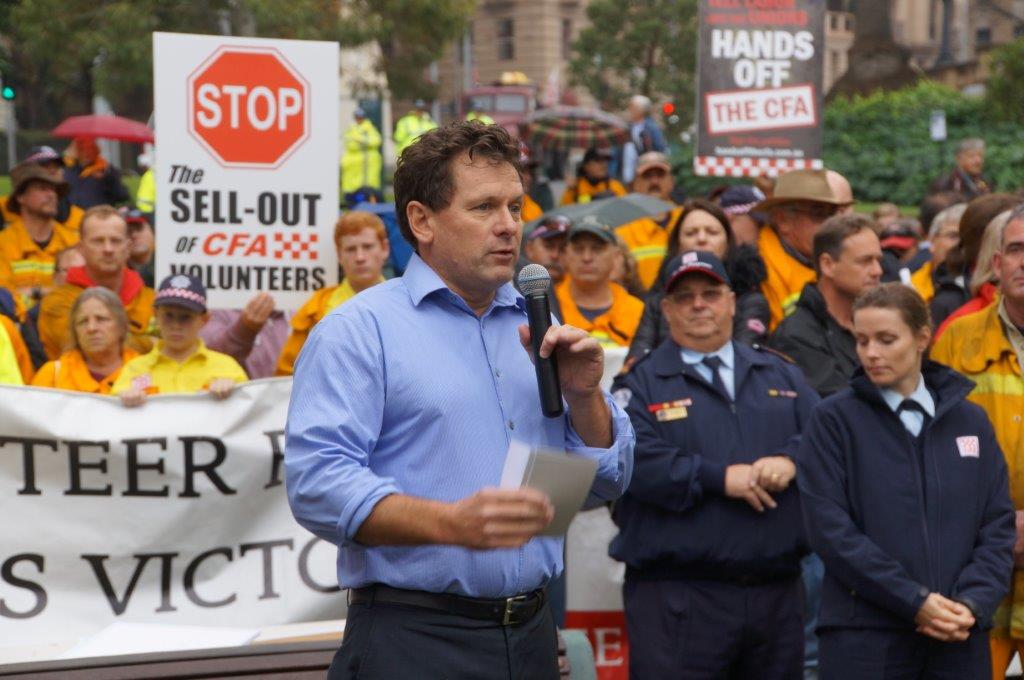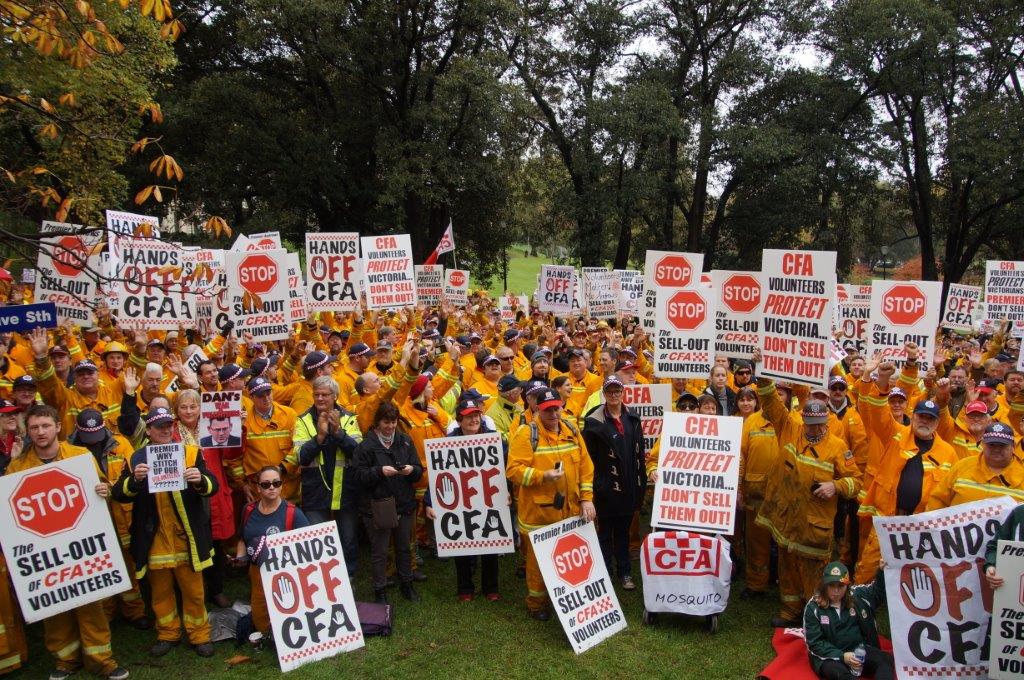VFBV FireWise Column - July 2016
In This Edition
- Farewell to Chief Officer Joe Buffone
- Federal Election Impacts on CFA
- CFA/EBA Volunteer Feedback
- VFBV's Concerns with the proposed EBA
- Have Your Say - Register here for the 2016 VFBV Volunteer Welfare & Efficiency Survey
Farewell to Chief Officer Joe Buffone
By Andrew Ford, Chief Executive Officer
On behalf of the VFBV Board and volunteer leaders across CFA, it was with sadness and regret that we heard that Chief Officer Joe Buffone tendered his resignation.
The CFA Chief Officer holds a special place in volunteer’s hearts. He has been our operational leader and our symbolic head of authority in our shared mission to protect lives and property. Joe has exercised his responsibilities and authority with honesty, integrity and compassion.
Joe has been very clear in his recent messages and letter of resignation, that as Chief Officer he would have been unable to discharge his legislative responsibilities under the proposed industrial agreement, confirming that the latest changes do not address his fundamental concerns. Joe, just as Minister Jane Garrett and CEO Lucinda Nolan before him, had to choose between following his conscience and his job. As CFA’s most senior operational officer, he has acted with respect and integrity and done everything in his power to protect the safety of Victorian’s and remain impartial. He has, like those before him, been clear and unequivocal about the impacts the proposed agreement would have not just on volunteers but on CFA and its ability to discharge its responsibilities, in particular the powers of the Chief Officer.
Joe was appointed by the Andrews Government on 15 October 2015, and came to CFA from Emergency Management Victoria where he was the Deputy Commissioner of Risk & Resilience. the Andrews Government also appointed the now Ex-CFA CEO Lucinda Nolan in November 2015, a distinguished Deputy Commissioner with Victoria Police with over 30 years’ experience, including acting as Police Commissioner.
Attempts by some to discredit a man that has spent over 25 years in the emergency services encompassing senior roles with the Victoria State Emergency Service, Marine Safety Victoria, Port of Melbourne Corporation and Department of Infrastructure and served with the Australian Defence Force in Special Forces are quite disturbing. Both Joe and Lucinda have spent their entire lives serving the public in senior emergency response roles. Both have withstood the test of time and responsibility over their careers, that such important roles demand.
Just like the Government’s spin about our court injunction “being lifted” and forgetting to tell the Victorian public that it was replaced with an even more onerous Court Order, they have again only told half the story.
Joe resigned on the Tuesday.
Joe has stated publically that Minister Merlino’s statements to the media about the factors underpinning his resignation are “absolutely incorrect”.
VFBV understands that it was after his resignation that Government and/or EMV officials resisted his resignation, prompting discussions about what terms might be required to convince Joe to stay. It is entirely understandable that those terms might have included ensuring Joe had the organisational standing and powers to perform his role without the threat of being administratively overridden; it is also understandable that he might have sought confirmation about the security of his job tenure in order not to be threatened with being sacked if he didn’t toe the Government line against his assessment of the CFA statutory obligations that create and direct his role.
Despite the half stories being quoted by people in the media, VFBV understands that Joe, after carefully considering his options, and concluding that he was simply unable to reconcile what he was being asked to do with what he knows are his statutory and legal obligations, advised Government he would not reconsider his resignation. As Joe reminded volunteers, when things go wrong, it will be the Chief Officer who will be in the stand, as occurred during the Victorian Bushfires Royal Commission. It is therefore incumbent on the person who holds that office, to ensure they have the powers necessary to fulfil their role, and his assessment was frank and fearless. The proposed agreement is not good for CFA, it is not good for volunteers and it is not good for Victoria.
Joe has prosecuted his case in a respectful, professional and poignant way. He has gone to extremes to remain balanced and impartial, and operated as a loyal and honest broker. He will be remembered as the Chief who stood up for what he believes is right, and leaves with our utmost respect and thanks. Joe, your stance to attempt to save CFA has been exemplary.
Thank you for your service and dedication, we won’t forget you.
FEDERAL ELECTION IMPACTS ON CFA
As this edition of Firewise goes to print, volunteers across Victoria are working within communities to express their concern about the current CFA/UFU industrial agreement negotiations. The issue has been made a federal election issue by the timing of Victorian Premier Andrews push to ram the deal through and because the deal is using federal industrial relations legislation to override CFA State legislation to give control of CFA to the UFU.
Although some people are saying this is a state issue, it is both a federal and state issue because the UFU deal is using federal industrial legislation to take control of and override CFA state legislation. The links will become clearer as the federal debate proceeds in the new parliament. As this edition goes to print, there is a solution on the table from Malcolm Turnbull, we are still hoping for help with a solution from Bill Shorten and we will continue to pursue support for the necessary changes from all members of parliament.
VFBV and volunteers have remained non-party political throughout this dispute and will remain so. There is no doubt that we have enormous community support across Victoria. Many people have said to volunteers across the State that they share our disgust and anger with Premier Andrews about the sell-out of CFA. In recent days newly appointed Minister Merlino has attacked the integrity of our CFA Chief Officer Joe Buffone who resigned because he said the UFU EBA proposed deal would make it impossible for him to fulfil his statutory role, and this is just another demonstration of how low people pushing this deal are prepared to go. UFU Secretary Peter Marshall, Premier Daniel Andrews and Minister James Merlino have politicised the Fire Services. Public safety should be above party politics, and VFBV deplores the approach this government has taken on this issue, wedging volunteers, their paid colleagues and the community against each other. They have criticised and acted to gag VFBV, CFA Board, CFA CEO, CFA Chief Officer and their own Minister, Jane Garrett for speaking up, but we will not step back or apologise for defending volunteers and the communities they protect. We will not be gagged.
Whatever happens at this 2016 federal election, volunteers need to continue to hold our heads high as we continue to seek a fair hearing on this issue and to sustain Victoria’s proud history of CFA volunteering.
CFA/EBA Volunteer Feedback
You can now download the current version of the proposed CFA-UFU Operational Staff Enterprise Agreement 2016 (version 17.4), that has been provided to VFBV for consultation purposes arising from our recent court action to enforce the consultation provisions of the Volunteer Charter.
We now urge you to examine the EBA and use the feedback form available on this website covering such things as:
- questions
- concerns
- practical Implications
- local volunteer capacity implications
- impacts on CFA operating as a fully integrated organisation
- potential to discourage volunteers or impact on their welfare and efficiency
- potential impacts on CFA’s volunteer based culture
- anything that might limit or erode support for volunteers
- anything that impacts on CFA’s ability to genuinely consult with volunteers
The document should serve to dispel any criticisms of VFBV’s broad concerns and comments made to date as “unfounded and misleading” by Premier Andrews’, new Minister Merlino and UFU leadership.
Clearly this latest version speaks for itself as did earlier versions when they were made public. The matters of concern that we have raised are either written in the document itself or would be the necessary outworkings of the implementation and operation of various clauses on volunteers and the organisation and operation of the CFA as a volunteer based and fully integrated fire and emergency service.
Recent independent legal commentary by Mr Jack Rush QC sums it up well, by stating that the UFU EBA proposal is contrary to the CFA Act because it works against the idea that CFA is first and foremost a volunteer based organisation in which volunteers and paid staff are to work in a fully integrated manner; it undermines the role of volunteers; and it provides unprecedented powers to the UFU.
VFBV’S CONCERNS
At a fundamental level our concerns with previous drafts of the UFU EBA proposal are not addressed. There has been some change in the detail but the EBA still includes clauses that interfere with the Chief Officer’s operational resource decision making autonomy; directly impact on the provision of support to volunteer brigades; affect the way the CFA integrated system works; affect the role of volunteers and impact on CFA brigades across Victoria, not just the 34 Integrated brigades as stated by Premier Andrews and recently appointed Minister Merlino.
Recent claims made by Premier Andrews and Minister Merlino that the UFU EBA proposal only impacts on the work of paid staff or on the way CFA’s 34 Integrated brigades operate is not only fundamentally wrong in terms of the way CFA’s volunteer and integrated brigades network together to respond to incidents but it is also categorically wrong given the fact that:
- provision of Brigade Administrative Support (BASO) to all CFA volunteer brigades will be altered by clause 15;
- the support provided by CFA Volunteer Support Officers to CFA volunteer brigades across Victoria will be altered by clause 16;
- the UFU EBA (17.4) proposal perpetuates the UFU’s long running ban on any volunteer brigade being supported by Community Safety Facilitators despite volunteer brigades repeatedly pointing out that this brigade support initiative is still regarded as one of the most successful volunteer support initiatives ever;
- at any fire ground where volunteers and paid staff come together at an incident the reporting relationships and line of control becomes unclear given clause 35.4 which at a minimum creates confusion and at worst is likely to unpack the current CFA integrated system (not to mention it appears to specifically exclude DELWP staff being recognized as incident controllers);
- the UFU EBA (17.4) proposal perpetuates deficiencies in the CFA’s paid training staff workforce management arrangements, an issue highlighted repeatedly by volunteers, CFA and recent independent inquiries;
- the UFU EBA (17.4) proposal specifically dictates the future operational and resource arrangements for a number of fully volunteer brigades, despite Premier Andrew’s and Minister Merlino’s claims that there is no impact beyond the existing 34 integrated brigades
- the UFU EBA (17.4) proposal introduces changes to Road Accident Rescue, a function currently performed by many CFA and SES volunteer brigades and units
- the UFU EBA (17.4) proposal introduces a process to change the way CFA responds to incidents affecting many more brigades than the existing 34 integrated brigades and it is unclear how volunteers would be consulted about this process and form to date would suggest that if it ends in Fair Work Australia, volunteers would have no say
- various clauses requiring agreement between CFA and the UFU mean that obligations to consult with volunteers are likely to be sidelined or potentially ignored
- various clauses about dispatch of paid firefighters to incidents ignore the role and capacity of trained volunteer firefighters, impact on many more than the 34 integrated brigades and enable an EBA instrument to override the Chief Officer’s powers and decision making
- and the list goes on…
Sadly, most of the crucial concerns we have had with previous versions have still not been properly addressed. In spite of the Government’s claims, a new clause (7A.1) which states “The role of volunteers in fighting bushfires and maintaining community safety and delivering high quality services to the public in remote and regional areas and in integrated stations is not altered by this agreement” fails to recognise that CFA brigades do more than fight bushfires in remote and regional areas and either cleverly or by accidental omission ignores the fact that CFA volunteer brigades service a huge part of metropolitan Melbourne and provincial centres & townships across Victoria.
We will be asking for clarification during this consultation stage as to what this clause means and how it works when other clauses contained in the EBA specifically contradict this clause. We know that CFA’s own assessment is that the EBA clauses affect many more than the 34 integrated brigades and fundamentally alters the way CFA works today as a volunteer based and integrated system. By what it omits to say, if this clause is aiming to suggest that the role of volunteers in outer metropolitan Melbourne and urban communities will be altered, then this would be a matter of serious concern. The failure of this clause to specifically recognize the role of volunteers in the urban risk environment is consistent with our assessment of the impact of many of the clauses that this EBA would have on the CFA volunteer capability that we have today, and at a fundamental level reinforces our concern.
Premier Andrews and Minister Merlino continue to make public comment that all volunteer issues have been addressed despite the fact that they still have not bothered to seek to understand VFBV’s concerns. Instead the Minister has advised us that Cabinet have made their decision.
Until the consultative process we are working through with CFA is completed, and despite the Government ignoring Ex Minister Garrett’s, the now sacked CFA Board’s, and the Ex CFA CEO Lucinda Nolan’s advice, we remain hopeful that the Government will not continue to ignore volunteer and VFBV concerns.
Because of the Court arrangements, timelines for both member/brigade consultation and direct consultation with CFA are very tight and your expedited assistance is required.
Our next formal discussion with CFA is currently scheduled for Friday, 8 July and it is anticipated that a schedule of formal consultation meetings with then continue until 19 July.
We are looking to volunteers to respond as early as possible. All responses will be kept confidential, and will all be consolidated to anonymize any responses. You can send your feedback back to This email address is being protected from spambots. You need JavaScript enabled to view it.
HAVE YOUR SAY
The 2016 VFBV Volunteer Welfare & Efficiency Survey opens from 15 July to 29 August, and volunteers will no doubt have plenty to say this year.
Register now at www.vfbv.com.au/cfa or call (03) 9886 1141 for a printed copy.
This volunteer run survey is in its 5th year, and a record 2,500 volunteers took part last year. Your answers are confidential and the final results go to the VFBV and CFA Boards, the Emergency Management Commissioner and the Minister for Emergency Services.
VFBV FireWise Column - June 2016
In This Edition
CFA VOLUNTEERS AND COMMUNITY MAKE A STAND
- 3,500 volunteers rally in Melbourne
WA ACTS ON CANCER LAW
SURVEY OPENS SOON
FISKVILLE INQUIRY
VFBV MULTI-AGENCY YOUTH NETWORK
AFFILIATION DUE NOW
CFA VOLUNTEERS AND COMMUNITY MAKE A STAND
By Andrew Ford, Chief Executive Officer
As we go to press, CFA is poised at a potential turning point in its history.
We have staged a successful rally, with all political parties invited to be represented, where 3,500 volunteers heard words of support from the Prime Minister and the Victorian Leader of the Opposition, and there was extended applause from the crowd for Victorian Minister for the Emergency Services, Jane Garrett (see video from the rally here), but the issue remains unresolved.
We face the prospect of an Enterprise Bargaining Agreement between CFA and the United Firefighters’ Union that will mean the progressive dismantling of CFA as a volunteer and community based, fully integrated service.
And while Cabinet has delayed a final decision, the Premier’s comments still suggest he is forging ahead regardless of our concerns, to the exclusion of volunteers’ opinions or the consultation and involvement in decision making guaranteed by the recognition of the provisions of the CFA Volunteer Charter in the CFA Act.
We have written to the Premier, Deputy Premier, Minister and every member of Cabinet, urging them to meet with us and understand our concerns before decisions are made.
To make matters worse, Fair Work Australia has rejected VFBV’s application to be heard on behalf of volunteers; our letter to FWA is available on our website, and makes the point that “the proposed EBA contains a significant number of clauses which affect and impact CFA volunteers and related organisation and operation of CFA”.
Lined up against the objectionable parts of the UFU’s proposed Enterprise Bargaining Agreement is the unified opinion of volunteers, CFA senior managers, CFA’s Chief Officer and CEO, the CFA Board and Minister for Emergency Services Jane Garrett.
The CFA Board has reaffirmed its stance against the union’s log of claims, publishing a list of 14 threshold issues, and saying they would:
- Remove or diminish the ability of the Chief Officer to allocate and deploy resources flexibly and with agility
- Require agreement or provide veto to UFU over CFA management decision
- Restrict or negatively impact on volunteers and BASOs.
- Be discriminatory
The United Firefighters Union has persistently denied that the proposed EBA will affect volunteers, but that does not match up with our reading of the document, CFA’s detailed responses to the union’s claims – as published for all members on the CFA website – and Minister Garrett’s published comment that the UFU’s demands are “over the top, unaffordable and compromise community safety”.
Both the CFA Board and VFBV are still pressing for meaningful discussion with the State Government, and volunteers have taken to the streets to show their support for the Minister who has clearly supported us and the communities we volunteered to protect.
We cannot afford to back down on this issue.
The marginalisation and progressive destruction of urban volunteerism set off by this EBA would mean Victoria loses its world renowned surge capacity to fight simultaneous large bushfires and long duration fires whilst maintaining fire and emergency services to local communities.
We have no interest in nor argument with the paid firefighters negotiating hard for pay increases and those aspects of the EBA that deal with legitimate employment conditions of individual paid employees such as leave and rosters. Our only wish is that those matters be resolved as quickly as possible and that the government provide additional funding to CFA to cover the full costs of these increases.
Our interest is the future of the volunteer and community based CFA, the future of CFA volunteerism and the protection of our communities.
These will be testing times but we must remember not to make this debate a personal one, and at all times we need to respect one another as volunteers and paid members of CFA who work well together today and must continue to work well together tomorrow for the benefit of the Victorian community.
Volunteers need to remain ready to escalate action publicly if the government’s decision making process looks like delivering an unfair or foolish outcome.
In the meantime, members should continue actively publicising our concerns at every opportunity you have and activate all of your community networks and continue writing your concerns to MPs and decision makers.
At a national level, the collective body of volunteer firefighter associations is mobilising and keenly watching a problem developing in Victoria that has serious flow on implications in each state. In addition, our 250,000 brother and sister fire volunteers, along with SES volunteers, have a direct and keen conviction to pursue Federal Legislation that protects and respects volunteers. This has been a priority for some time and the time to pursue this with vigour has never been better than now, particularly given that the message has now resonated right up to Prime Minister level. We will be actively seeking to talk to all sides of Federal politics to encourage and obtain their active support for this fundamental issue and volunteer right.
VFBV is working hard as the voice of volunteers, you can now add volume to that voice, by contacting local MPs and local media with your concerns. Every volunteer’s voice deserves to be heard, and the State’s decision makers must hear it.
WA ACTS ON CANCER LAW
Western Australia has just introduced presumptive legislation to give firefighters fairer and simpler cancer compensation.
The Bill before the WA Parliament does not match the current standard met by Queensland and South Australia, where volunteers and staff are treated equally, but it is well ahead of the out-of-date and discriminatory Tasmanian legislation being considered as a model for a possible Victorian Bill.
The WA legislation lists the same cancers and years of service requirements that appear in other States’ legislation, and is backdated to 13 November 2013, the date WA’s legislation for career staff took effect.
However, the WA legislation also includes an additional eligibility requirement that only applies to volunteers, who must have at least five years’ volunteer service where they have attended an average of at least five hazardous fires per year, where hazardous fires include building, vehicle or rubbish fires.
In Victoria, CFA volunteers are still waiting, with unanswered questions about whether the proposed Victorian legislation will treat career and volunteer firefighters equally, and whether it will be retrospective, providing cover for volunteers who have already been diagnosed with cancer.
VFBV continues to press this issue with the Government and MPs. Let your local MPs know this issue is important to all volunteers.
SURVEY OPENS SOON
The 2016 VFBV Volunteer Welfare & Efficiency Survey will open on 15 July. CFA volunteers can register online now at www.vfbv.com.au/cfa or visit the vfbv website to find the link.
Last year a record 2,500 volunteers took part. More participants means greater influence for the survey results when we take them to CFA, the Emergency Management Commissioner and the State Government.
We are also hosting a version of the survey for other Victorian emergency volunteers, who can register at www.vfbv.com.au/vcf and from this year interstate fire volunteers can register at www.vfbv.com.au/cavfa
The VFBV Volunteer Welfare & Efficiency Survey is an annual snapshot of volunteer opinion, which includes 33 questions on issues chosen by volunteers.
This is the survey’s fifth year, and VFBV and the CFA Board study each year’s results to see trends in volunteer opinion on those important issues. Your comments are confidential, but the results go straight to the decision makers.
For more information click here or talk to your VFBV State Councillor.
FISKVILLE INQUIRY
The Fiskville Inquiry’s final report includes 31 recommendations and 125 findings, covering the management of hazards at the site, future safety measures, remediation of the site, the health consequences, and the effects on those directly exposed and others including nearby landholders.
VFBV fully cooperated and supported the Inquiry with detailed written submissions and more than an hour of evidence.
The issues we presented to the Parliamentary Committee began with the paramount concern of the safety of our members and ongoing support to any members who have been exposed in the past.
From the beginning, VFBV had pressed for expert, independent, transparent and accountable analysis of decisions, and the Parliamentary Committee’s Fiskville Inquiry represented the opportunity to ensure decisions, messages and treatment are based on facts, established independently by experts, in a properly transparent process.
VFBV also pressed for immediate government action to fill the gap in training capacity left by Fiskville’s closure. Just as being safe in training is paramount, there is a huge risk to firefighters when they are confronted with real life situations if they haven’t had access to appropriate real-to-life training.
Over the years, Fiskville provided hot fire training and the full range of state level and specialised skills in incident management, incident leadership, operational decision making and real-to-life operational exercises.
The Inquiry has called for ongoing support measures for those affected, and VFBV continues to press for the urgent introduction of sufficient training capacity to replace Fiskville and meet CFA’s needs, and for the sector to set and support clear water standards based on expert opinion, for all agencies – something that has been lacking.
VFBV MULTI-AGENCY YOUTH NETWORK

VFBV is making great progress with our Youth Network.
On the back of a very successful CFA Youth Forum on 21 May (pictured), over 60 young people from all across Victoria have signed on to join the VFBV Multi Agency Youth Network. The link below has been forwarded to all District Council executives for circulation. Please pass this link to any young CFA volunteers, or young volunteers from other agencies, who might be interested.
https://www.surveymonkey.com/r/vfbvyouth
Champions have been identified in 10 Districts so far. If there is someone in your District who would do a great job of being the young volunteers’ connection with District Council and source of experienced CFA and VFBV knowhow, please encourage them to contact their District Council executive or Chris Fryer at 9886 1141 or This email address is being protected from spambots. You need JavaScript enabled to view it.
AFFILIATION DUE NOW
Renewal notices for your Brigade/Group’s VFBV Affiliation and Brigade’s VFBV Volunteer Welfare Fund subscription are with your Secretary now, with a due date of 30 June, 2016.
The modest cost of $77.50 for VFBV affiliation is the same for all Brigades and Groups, and VFBV’s representation of CFA volunteers continues to win growing approval and support, with a record 94% of Brigades affiliating in 2015/16
We also strongly encourage Brigades to subscribe to the VFBV Welfare Fund in the interests of supporting your members in times of personal hardship. It should be noted that in order to access the VFBV Welfare Fund, your Brigade must be affiliated with VFBV, since the association pays all of the VFBV Welfare Fund’s operating costs. For full details visit the VFBV website www.vfbv.com.au and go to the Member Services area.
For any enquiries, contact your VFBV State Councillors or call us on (03) 9886 1141.
CFA Wellbeing Survey
CFA’s 2015 Wellbeing Research Survey closes at midnight this Sunday, 20 December.
The survey is anonymous, takes about 15 minutes to complete and is designed to help CFA improve its mental health and wellbeing services for all members.
If you have questions about the survey or would like a paper based version of it, please contact CFA’s wellbeing intake line on (03) 9262 8409.
To take the survey online, click on this link
For more information about CFA’s support services, go to
Stand up to stigma: let’s talk about mental health
The 2015 CFA Wellbeing Research Survey is now under way.
The survey is open to all CFA members and can be completed online at https://secure.insyncsurveys.com.au/surveys/CFAWellbeingResearch2015/ up until 20 December this year.
The survey only takes about 15 minutes to complete and your feedback will help to improve CFA’s mental health and wellbeing services for all members.
Psychological health and safety is a key part of CFA’s new ‘Safety’ value. The 2015 wellbeing survey aims to support mental health and wellbeing in CFA thereby supporting Safety for all our members.
Responses to the survey will remain anonymous.
For more information or if you would like a paper based version of the survey, please contact CFA’s wellbeing intake line on (03) 9262 8409.
VFBV Survey Attracts Record Numbers
More than 2,500 volunteers have taken the 2015 VFBV Volunteer Welfare & Efficiency Survey and the new VICSES version of the survey this year.
Volunteers’ responses are being studied for the survey report, which will go to VFBV and CFA Boards, CFA’s senior management, VICSES, the Emergency Management Commissioner and the Minister for Emergency Services.
You can see the 2014 report at www.vfbv.com.au
Each year’s results are compared with previous years' figures to show trends in how volunteers feel on each issue.
It is a co-operative process; VFBV and the CFA Board studied the first three years' results and continue to use the survey to highlight aspects of volunteer support that need attention.
The annual survey is making your association’s representation more effective and giving every volunteer the chance to be heard.
You can sign up for the 2016 survey by sending your name, Brigade/Unit and District or Region to This email address is being protected from spambots. You need JavaScript enabled to view it. or request a posted survey on paper by calling (03) 9886 1141.
2015 VFBV Volunteer Welfare & Efficiency Survey
Click here to take The 2015 VFBV Volunteer Welfare & Efficiency Survey
Click here to learn more about the annual survey
Talk to other volunteers in your Brigade about taking part - More participants means greater influence for the survey results when we take them to CFA, the Emergency Management Commissioner and the State Government.
The survey is open until 31 August 2015.
You can see the 2014 results by clicking here
This year, VICSES volunteers have their own survey, hosted by VFBV on behalf of VESA – VICSES volunteers can click here to take part or find out more here.
2015 Volunteer Welfare & Efficiency Survey - Open Now
The 2015 Volunteer Welfare & Efficiency Surveyis now open until 31 August - to complete the survey now click here.
The Victorian Emergency Service Association (VESA) invites all VICSES volunteers to take part in a volunteer-run survey that will better equip your association to advise VICSES and Government on what’s most important to volunteers.
The survey as designed and road tested with emergency management volunteers, so it gets straight to the point on issues that matter to the people on the front line. The survey includes 33 questions on those issues, and takes 10 to 15 minutes to complete. Each question asks how important the issue is to you, and how well you feel it is being handled by VICSES.
Why a volunteer survey?
This annual survey began with the CFA volunteers’ association, Volunteer Fire Brigades Victoria (VFBV) three years ago, and VFBV is how hosting the VICSES volunteers’ version on behalf of VESA.
The results will be compared year to year, to show trends in how volunteers feel on each of the issues. It is a co-operative process; VFBV and the CFA Board both study the CFA volunteers’ version to highlight aspects of volunteer support that need attention. VESA will put our survey to the same use, providing reliable facts and figures to support the association’s representation of all VICSES volunteers.
Your individual answers will be confidential, but the overall results will go straight to the decision makers.
The survey is designed to identify the factors that volunteers feel have a key impact on their welfare and efficiency, to establish ways of measuring whether things are getting better or worse, and to develop a process that uses these measures to ensure better support for VICSES volunteers and Units.
Open to all VICSES volunteers
This survey is making our representation more effective and making sure every volunteer’s voice has the chance to be heard, whether you and your Unit are actively involved with VESA or not.
Last year’s survey drew more than 1,600 responses.
The survey will give VESA facts and figures we can use in working for the benefit of volunteers, Units and the communities they protect, so we urge all VICSES volunteers to take part.
To complete the survey now, click here.
If you would prefer a paper survey sent by post, contact This email address is being protected from spambots. You need JavaScript enabled to view it. or email the VESA Secretary at This email address is being protected from spambots. You need JavaScript enabled to view it.. The survey will remain open until 31 August 2015.
VFBV Welfare & Efficiency Survey 2015 - Open Now
The survey is now open until 31 August - to take part now, click here.
Volunteer Fire Brigades Victoria (VFBV) invites all CFA volunteers to take part in a volunteer-run survey that will better equip your association to advise the CFA Board and State Government on what’s most important to volunteers.
We designed and road tested the VFBV Volunteer Welfare & Efficiency Survey with volunteers, so it gets straight to the point on issues that matter to the people on the front line. The survey includes 33 questions and takes 10 to 15 minutes to complete. Each question asks how important the issue is to you, and how well you feel it is being handled by CFA.
Why a fourth survey?
This year’s survey results will be compared with the first three years' figures, to show trends in how volunteers feel on each of the issues. It is a co-operative process; VFBV and the CFA Board both studied the first three years' results and will continue to use the survey to highlight aspects of volunteer support that need attention. Your individual answers will be confidential, but the overall results will go straight to the decision makers.
The survey is an important step forward in volunteer representation. VFBV is established under the CFA Act to represent volunteers on all matters that affect their welfare and efficiency, and the VFBV Board commissioned this project to identify the factors that volunteers feel have a key impact on their welfare and efficiency, to establish ways of measuring whether things are getting better or worse, and to develop a process that uses these measures to ensure better support for volunteers and Brigades. By repeating the survey periodically, VFBV can track trends in volunteers’ opinions.
Open to all CFA volunteers
Most Brigades are affiliated with VFBV, its officials are CFA volunteers and VFBV represents volunteers in dealings with CFA, the State Government and Opposition, and official inquiries, on everything from routine equipment and procedures to the future of the emergency services as a whole. This survey is making our representation more effective and making sure every volunteer’s voice has the chance to be heard, whether you and your Brigade are directly involved with VFBV or not.
Last year’s survey drew more than 1,600 responses.
The survey will give VFBV facts and figures we can use in working for the benefit of volunteers, Brigades and the communities they protect, so we urge all CFA volunteers to take part.
To take part in the survey, click here.
2014 VFBV Volunteer Welfare & Efficiency Survey
The report on the 2014 VFBV Volunteer Welfare and Efficiency Survey is now available - you can read it online here or download it below.
We encourage volunteers to read the report, and to register for the 2015 survey now (see below, the survey starts in July).
This annual survey looks at trends in volunteer opinion, and would not have been possible without the more than 1,600 CFA volunteers who took part in 2014.
The survey began in 2012 and is put to work as a productive tool by both VFBV and CFA. This year’s results once again confirm some strong trends that are clear pointers to paths for improvement by CFA.
VFBV will soon run several Drill Down Workshops with groups of volunteers, looking at the outcomes, the causes and possible courses of action. To add your comments, talk to your District’s VFBV Delegates or call Cliff Overton at the VFBV office on (03) 9886 1141.
Please encourage your Brigade members to sign up for the 2015 survey - send your name, district and email address to This email address is being protected from spambots. You need JavaScript enabled to view it. and you will receive an invitation by email. Call (03) 9886 1141 if you require a printed copy of the survey by regular mail.
You can read the full report on the 2014 survey here or download a PDF copy below.
You can sign up for the 2015 survey here.
2014 VFBV Volunteer Survey - CEO's Foreword
 The 2014 VFBV Volunteer Welfare and Efficiency Survey is the third annual survey of Victoria’s CFA volunteers conducted by Volunteer Fire Brigades Victoria.
The 2014 VFBV Volunteer Welfare and Efficiency Survey is the third annual survey of Victoria’s CFA volunteers conducted by Volunteer Fire Brigades Victoria.
Whilst there are areas for improvement, it is pleasing to see a trend of gradual improvement against many of the survey aspects. The survey’s intent and main benefit is in guiding effort and focusing energy on just such improvements.
The survey is a practical starting point for conversation and continuous improvement, and with the cooperation of all involved it continues to fulfil the hopes we had for it when we launched it three years ago.
The survey is run by VFBV, informed by growing numbers of volunteers and being put to work as a productive tool by both VFBV and CFA. This year’s survey results once again confirm some strong trends that are clear pointers to paths for improvement by CFA.
A practical and productive document, this survey would not have been possible without the support of CFA volunteers, and our special thanks go out to the more than 1,600 members who participated in 2014.
To all of the volunteers who read this report, I urge you to take part in the 2015 survey and to encourage other members of your Brigade and Group to do the same. By registering now, you can receive the survey by email or by post when it begins in July, and by doing so, you add your own voice to those of the more than 1,600 CFA volunteers who had their say last year.
Andrew Ford
Chief Executive Officer
Volunteer Fire Brigades Victoria
2014 VFBV Volunteer Survey - Volunteer Satisfaction
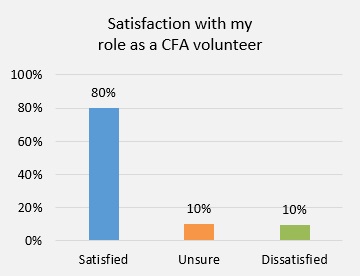
Survey respondents are asked to rate their satisfaction with their role with CFA, the way they are treated by CFA, their intentions to remain a CFA volunteer and their likelihood to recommend being a CFA volunteer to others.
The 2014 survey results across the four satisfaction questions are highly aligned to the 2013 results. 80% of respondents are satisfied with their role in CFA in 2013 and 2014, whilst there is a 2% shift in 2014 from ‘unsure’ to ‘dissatisfied’.
A 2% shift in 2014 from ‘dissatisfied’ to ‘satisfied’ has increased volunteer satisfaction with the way they are treated by CFA from 57% to 59%.
Satisfaction levels with the way volunteers’ rate their treatment by CFA shows the greatest improvement across all satisfaction measures – with a 5% increase in satisfaction from 2012 to 2014.
The ‘intention to continue my role with CFA’ results are identical for 2013 and 2014.
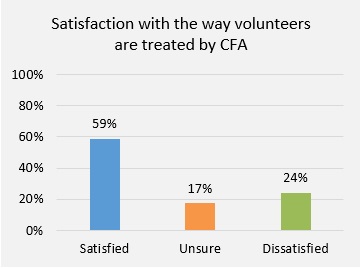
A 1% change in the 2013 and 2014 results for the satisfaction statement ‘I would recommend being a CFA volunteer to people I know’ sees the yes score increase to 81%.
As stated previously, the comparatively low satisfaction score with the way volunteers feel they are treated by CFA suggests that the greatest potential impact on future volunteer welfare and efficiency sits with CFA in the success or otherwise, of their partnerships with volunteer brigades.
In addition to the broader satisfaction questions, survey results against each statement for the past three years can be compiled to observe trends in active satisfaction and active dissatisfaction.
Survey results suggest that whilst volunteers continue to be most satisfied with the support and encouragement they receive at local brigade level, they remain actively dissatisfied with CFA’s performance in relation to consultation at a District, Regional and Corporate level.
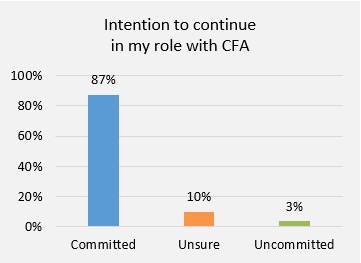
Eleven survey statements scored satisfaction levels markedly higher than the rest of the survey. The same statements have also scored consistently higher for the past three years and in most cases, have shown an improvement in satisfaction levels over that time. These statements relate to the range of factors that contribute to a welcoming and rewarding local brigade environment, that is supportive of volunteers and operating well at a local brigade level.
One statement “volunteers are effectively consulted and involved in decision making at CFA Corporate level” scored dissatisfaction (37%) higher than satisfaction (21%) as well as achieving the lowest satisfaction rating. The same statement scores the second largest gap in survey results and demonstrates an ongoing need for improved consultation between volunteers and Corporate CFA.
Two other statements scored dissatisfaction levels just below satisfaction, consistently over the past three years.
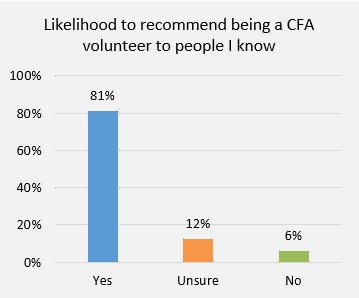
Both statements also relate to CFA policies, practices and workforce arrangements that integrate volunteers and paid staff and the impact these have on volunteer consultation and cooperation.
These results suggest there is an ongoing need for improved effort by CFA to build an effective volunteer-based organisation, in which volunteers are supported by employees in a fully integrated manner.
Given this is a fundamental obligation of CFA as described in the CFA Act, this is an area warranting close attention.
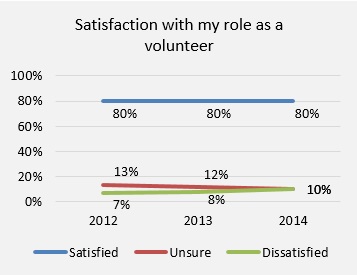
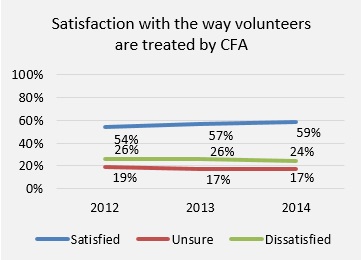
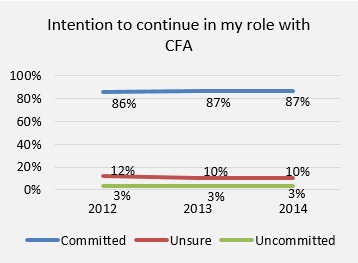
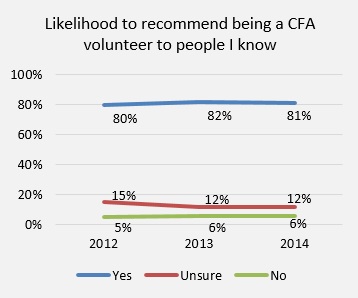
2014 VFBV Volunteer Survey - Demographic Variations
Survey respondents provide information that identifies their age, gender, length of time as a volunteer with CFA and brigade type. This information is collated and used to provide material for further analysis.
Gender
In 2014, 86% of survey respondents were male, and 14% female. This is an under representation of the total CFA female volunteer membership, as CFA data indicates that 20% of CFA volunteers are female. The promotion of future surveys to encourage an increased female representation closer to the total membership percentage would benefit the results.
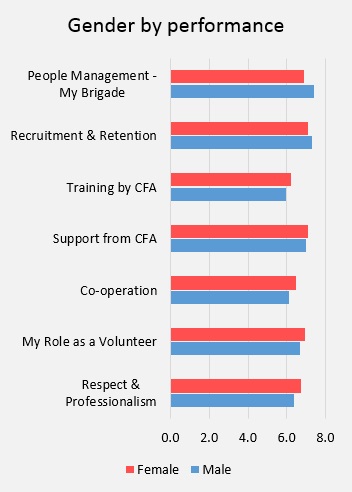

Female survey respondents rated ‘people management – my brigade’ and ‘recruitment and retention’ performance lower than male respondents across the seven themes.
The differences occur when the questions relate to CFA’s performance in conflict resolution, bullying and harassment, in which case, females rate the management of such issues lower than males.
The most telling survey response was in response to the statement “there are no barriers to the roles women can occupy in my brigade”. Females feel that importance and more so performance against this statement are lower than their male counterparts, therefore female respondents see a greater gap.
Nine other survey statements relating to recruitment, retention and brigade behaviour were tested against gender responses; none of the tested statements showed a gender influenced 1.0 gap difference in the above statement. No other statement showed more than 0.5 in gap difference when compared across gender.
More than one third (37%) of survey respondents were in the 40-54 age cohort, which is reflective of the 2010 volunteer participation rate by age as illustrated in the Victorian Auditor General Office 2014 audit Managing Emergency Services Volunteers (p.2).
Survey results broken down by the age range of the volunteer against performance scores show that the overall satisfaction in CFA and brigade is highest in the +65 age group. This may relate to a broader point in life where such views are possibly held on most issues.
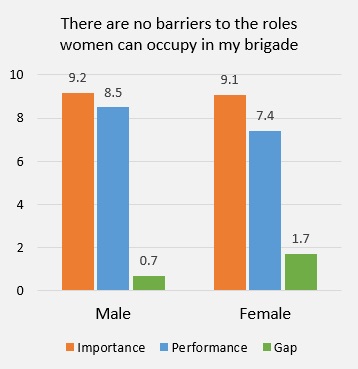
The second highest age range to rank CFA highly is the under 25 year old group, this may relate to length of service and a sense of optimism and future reward within CFA.
Age.
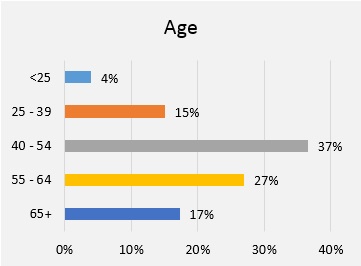
More than one third (37%) of survey respondents were in the 40-54 age cohort, which is reflective of the 2010 volunteer participation rate by age as illustrated in the Victorian Auditor General Office 2014 audit Managing Emergency Services Volunteers
Survey results broken down by the age range of the volunteer against performance scores show that the overall satisfaction in CFA and brigade is highest in the +65 age group. This may relate to a broader point in life where such views are possibly held on most issues.
The second highest age range to rank CFA highly is the under 25 year old group, this may relate to length of service and a sense of optimism and future reward within CFA.
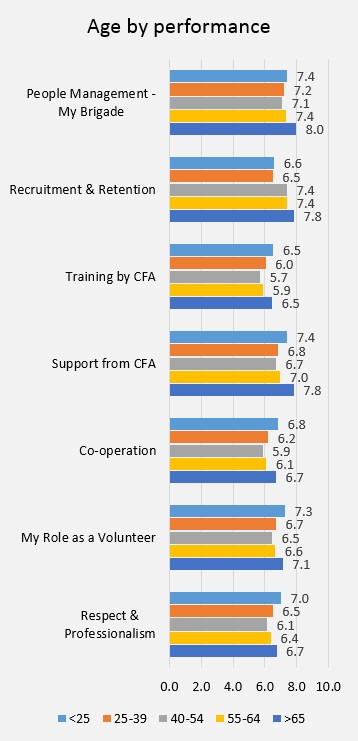
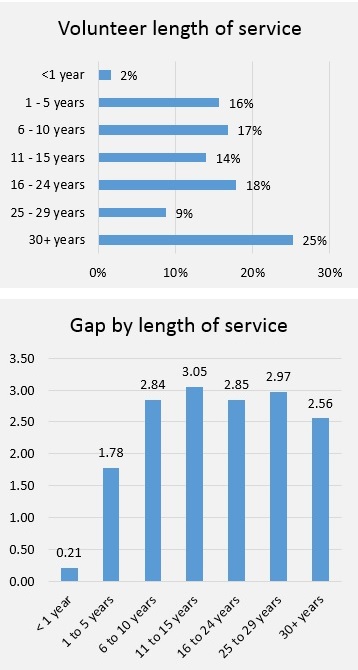
Length of service as a volunteer.
One quarter of survey respondents have spent more than 25 years as a CFA volunteer, the largest length of service group in the survey, whilst 2% had spent less than one year in CFA as a volunteer and 16% less than five years.
Survey results for gap scores were tested against respondents’ age range to see if trends could be identified.
Volunteer length of service created a distinct pattern across the question responses. Volunteers who have served with CFA for less than one year are the most positive about the organisation and their brigade on nearly every question.
Two distinct increases in the gap between importance and performance occur; firstly in respondents with more than one years’ service and then again in volunteers with more than five years’ service. The gap sharply increases after their first year of service, i.e. their level of satisfaction drops sharply after one year and then again after more than five years’ service
Length of service related positivity then begins to reduce the gap back up to the 30+ years’ service mark.
Brigade service/risk environment.
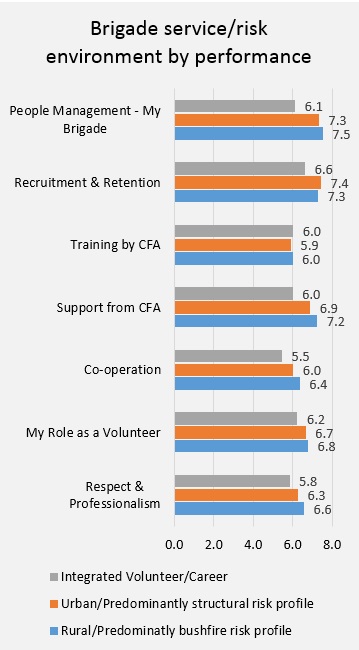
Volunteer membership of four types of brigade service/risk environment could be nominated by the survey respondents, these being;
- Rural/predominantly bushfire risk profile.
- Urban/predominantly structural risk profile.
- Integrated volunteer/career.
- Coast guard brigade.
Only one survey response was received from a coast guard brigade member, therefore this response has little impact on the brigade service environment analysis.
The integrated volunteer/career survey responses consistently scored lower on importance and more so on performance. Integrated brigades scored poorly on performance in relation to workplace bullying, conflict resolution, volunteer consultation, morale and supporting new volunteers. These particular statistical results point to ongoing issues within integrated brigades that require specific attention.
When the nominated brigade service/risk environment responses are tested against performance scores for the survey themes, the results generally show (for five of the seven themes) that brigades with a predominantly rural/bushfire risk rate CFA performance more highly and integrated volunteer/career brigade rate CFA performance the lowest. The only two variations in this trend are where all three brigade service/risk environments rate training performance very closely (6.0, 5.9 and 6.0) and where urban/predominantly structural risk brigades rate recruitment and retention performance higher.
The most marked variation in performance scores between brigade service/risk environments is in the ‘people management – my brigade’ theme where volunteers in integrated volunteer/career brigades rated performance 1.2 below urban/structural risk and 1.4 below rural/bushfire risk types.
The survey performance scores by brigade service/risk environment are reflected in some of the written survey comments, where volunteers feel that the treatment they receive and the relationship they have with career staff are not as good as they should be.
The survey results suggest that further work in understanding the specific issues facing integrated volunteer/career brigades is required in order to improve working relationships between CFA volunteers and CFA career staff.
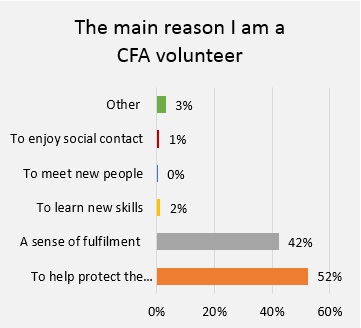
Reason for being a volunteer.
Survey respondents are asked to select their main reason for being a CFA volunteer from six listed options.
Slightly more than half the survey respondents (52%) nominated “to help protect the community I live in” as their main reason, whilst a considerable proportion (42%) nominated “a sense of fulfilment in supporting my community in a meaningful way” as their main reason.
These results are highly aligned to the 2013 survey results, where 50% of respondents nominated “to help protect the community I live in” as their main reason and 44% nominated “a sense of fulfilment in supporting my community in a meaningful way”.
The other four options for both the 2013 and 2014 survey results rated very low by comparison, (4% combined in 2013 and 6% combined in 2014).
When compared to satisfaction levels against the statement “I would recommend being a CFA volunteer to people I know” these results suggest that volunteers play an important part in recruitment, as they are highly motivated by their volunteer experience and keen to see others enjoy the same experience.
Awareness of VFBV.
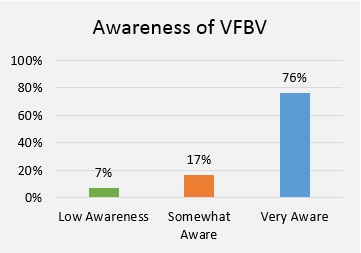
The number of respondents with reasonably high awareness of VFBV had grown from 71% to 76% compared to last year. There are still many volunteers with either low or only moderate awareness of VFBV, so this is an area for continued attention.
The comments received suggest that many volunteers feel a low awareness of VFBV or being aware of the VFBV overall but not feeling a good enough understanding of what VFBV does. Also, how processes work or how they easily access information on particular issues.
Consistent with previous years there is a diverse spectrum of comments regarding whether VFBV should be more forthright in representing volunteers through to some thinking VFBV is too assertive. Comments describing a tension between pursuing a fair go for volunteers and maintaining harmony, particularly regarding issues where CFA workforce culture, arrangements and industrial agreements impact on areas that also directly affect volunteers.
There are also a mix of comments regarding how VFBV should work as a close partner with CFA and Government versus VFBV needing to be more independent and more publically critical of policy and direction that is not good for volunteers.
Comments reinforce the desire of volunteers to have a grass roots connected, well organised, well-resourced volunteer voice but at the same time a strong concern that the funding of such a voice must not erode VFBV’s independence and objectivity.
There are many comments recognising improvements in VFBV engagement and visibility amongst volunteers and also many comments asking VFBV to communicate achievements more broadly and increase the profile of VFBV at brigade level.
A number of comments express a frustration that VFBV is not vocal enough in the public and media debate complaining of the absence of a strong CFA leadership voice. VFBV needs to do more to educate the community about the importance of CFA volunteers and to defend the reputation of volunteers, when it is put down by interest groups with particular agendas.
2014 VFBV Volunteer Survey - People Management - My Brigade
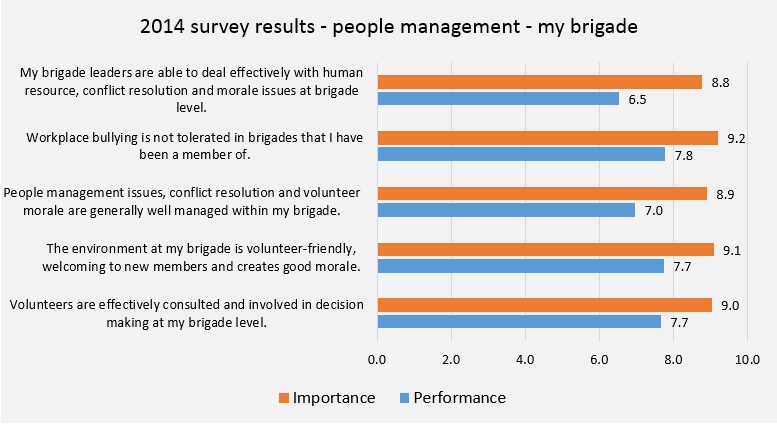
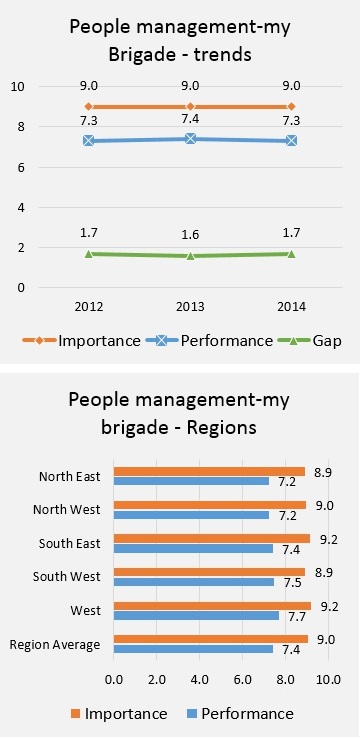
The 2014 survey scores for importance against specific statements in the ‘people management – my brigade’ theme scored equal highest against statement scores across the survey.
The statement “Workplace bullying is not tolerated in the brigades that I have been a member of” scored 9.2 for importance in the 2014 survey, consistent with the score of 9.3 received in 2013. The statement “the environment at my brigade is volunteer friendly, welcoming to new members and creates good morale” scored 9.1 for importance in the 2014 and 2013 surveys.
These scores are supported by written comments received from respondents that relate to their own brigades, with comments relating to a high level of importance amongst volunteers for a safe and welcoming brigade environment, free of bullying or other forms of harassment.
In the written comments, there is a common and substantial concern raised about bullying and harassment, and the poor level of response and support for resolving conflict when it does occur.
One interpretation of the spread and the tone of the commentary could be that when things are going well there is generally a high degree of satisfaction.
However, when there are problems in particular brigades or locations, these have a specific impact on the people involved and are generally not managed as well as they should be.
The comments are consistent with written survey responses to statement fourteen, suggesting that some brigades need more support in this area.
Comments also suggest that there are ‘cliques’, instances of ‘them and us’, ‘clubs’ and other cultural elements that negatively impact on volunteers generally as well as impacting on teamwork and the effective utilisation of many willing volunteers.
There are several comments suggesting conflict situations, problem individuals (both paid and volunteer) and problem cultural elements are not dealt with as quickly as they should be.
There is also a concerning trend suggesting that people are discouraged from speaking out and a repeating concern that officers responsible for dealing with conflict are not objective. A theme recurring through many responses is the need for better leadership development and a more effective process for dealing with conflict resolution that includes a safeguard against subjectivity (described as favouritism by some).
The commentary suggests that when things are working well (which is the predominant assessment across the survey) service as a CFA volunteer is reasonably comfortable, but when conflict escalates, the current approach does not cope as well as volunteers expect it to, leaving issues to escalate and cause long term impacts.
Some of the comments suggest a desire for CFA leadership and support staff to take a more active role when conflict resolution is required. Several comments seek a mechanism whereby VFBV or some other independent organisation can ensure reasonable protocols are in place and that appropriate support is provided to individuals in conflict or bullying situations.
Survey performance scores have dropped slightly from 2013, resulting in a gap score of 1.7. This theme is one of only two to see an increase in gap from 2013 to 2014 (respect and professionalism being the other theme with an increased gap).
West and South West Regions have lower gap scores than other Regions. Further analysis of the factors influencing these results may reveal more valuable information.
2014 VFBV Volunteer Survey - Recruitment and Retention
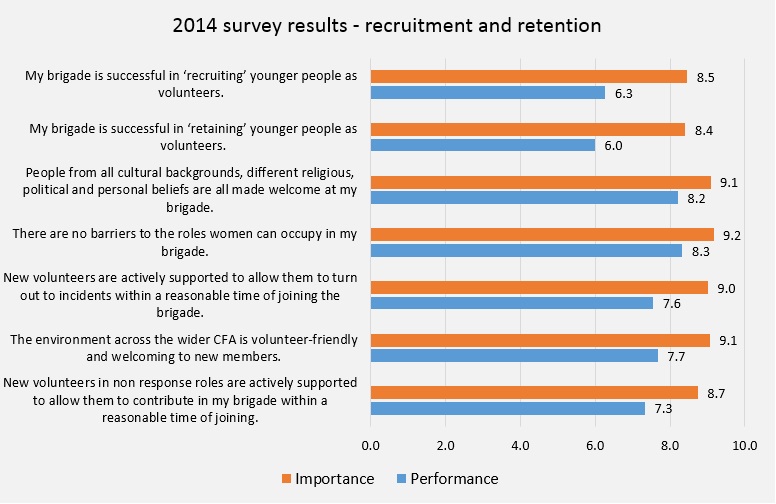
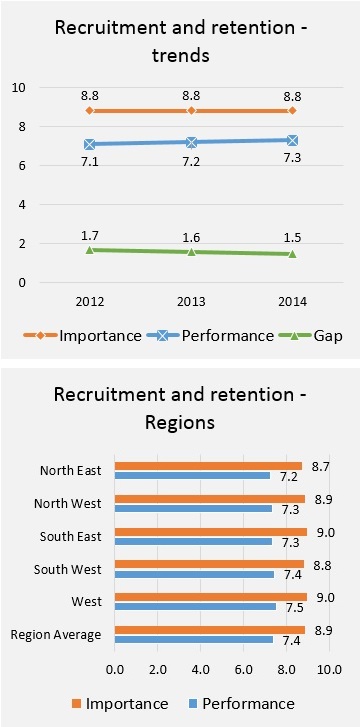
2014 survey result scores for importance in this theme produced the equal highest score for a single statement, that being “there are no barriers to the roles women can occupy in my brigade”, scoring 9.2. This is consistent with the same statement scoring the highest performance score in 2013 (9.3) and demonstrates how highly survey respondents value diversity within their brigades.
Following closely behind this score in the same theme is the statement “people from all cultural backgrounds, different religious, political and personal beliefs are all made welcome at my brigade”, which scored 9.1 on importance and 8.2 on performance.
The recruitment and retention theme received a comparatively small number of written comments as compared to other themes.
Of the negative comments received, there were several around CFA’s need to improve the respect for and treatment of females and that there are still pockets of unacceptable behaviour towards females. These comments support the high importance placed on gender equity in the survey scores.
There were comments acknowledging CFA’s ability to recruit, including younger members and people from more diverse backgrounds and roles however, a frustration exists in that training can be difficult to access or not matched to an individual’s progression in CFA, resulting in keen volunteers not staying or not being utilised.
The most common underlying factor present across most of the negative comments, is a frustration with CFA training, which leads to a negative force jeopardising volunteer retention. Ongoing issues with the difficulties associated with getting onto courses, the flexibility in recognising prior learning beyond the prescriptive CFA training and poor course organisation, were all mentioned.
Some comments expressed an opinion that the culture within CFA paid personnel is not volunteer focussed, and that an ‘us and them’ attitude dominates. One response suggests that CFA needs to incorporate a performance measure relating to volunteer training and retention into CFA staff performance, particularly for staff at integrated brigades.
Other comments suggest that CFA’s senior volunteers should have a stronger focus on mentoring new members. Some comments reflected on the personal experience members had over years of service with CFA and their desire to see future generations benefit from the experience.
2014 survey result scores for importance and performance in the ‘recruitment and retention’ theme produced the smallest gap across all seven survey themes. A gradual increase in performance against a consistent importance score over the past three years has continued to decrease the gap. The gap between importance and performance scores across all five Regions varies only slightly (0.3), and are the closest gap scores Region by Region for the seven survey themes.
2014 VFBV Volunteer Survey - Training by CFA
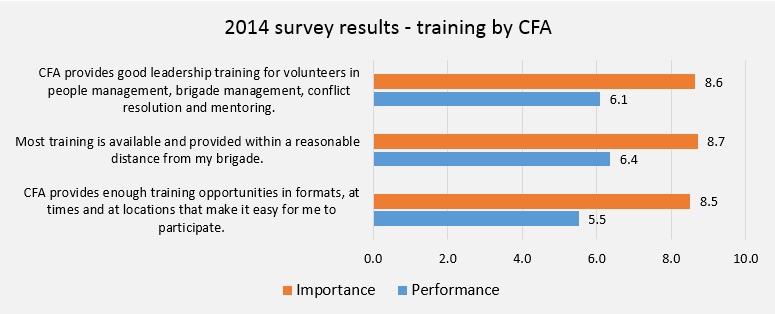
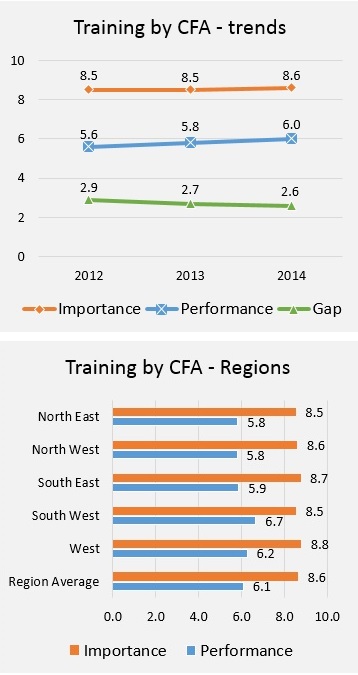
Within this theme, survey responses for the statement “CFA provides enough training opportunities in formats, at times and at locations that make it easy for me to participate” have generated the largest gap for the 2014 survey, consistent with having the second largest gap in 2013.
This same statement also received the lowest performance score for any survey statement in 2014 and second lowest score in 2013. The respondents scoring against this statement clearly indicates an ongoing dissatisfaction with the current level of service received from CFA in respect to training.
While written comments for other themes in the survey are brief and sometimes quite individual, the commentary for ‘training by CFA’ is detailed and focussed on common recurring concerns.
These recurring comments refer to a lack of training availability and opportunity, with negative comments on the frequency and timing of courses. Some comments refer to unsuitable training formats and a lack of access to specific training requirements outside of the standard operational training packages, such as leadership training and conflict resolution training.
Written comments also refer to the time taken between attaining qualification and receiving the personal protective equipment required to turn out, once qualified.
Survey responses express this as creating a frustration in volunteers who have made time available to train but are then unable to utilise their training and support their brigade.
These written comments in the training theme are reflective of responses under other themes relating to sense of worth, recognition and treatment of volunteers.
Of the written comments received, few were positive. One of the positive comments reflected an appreciation of the size of the training tasks in CFA and suggested that volunteers and brigades could be more proactive in identifying solutions.
An improvement in performance scores against a stable importance score has seen the gap decrease over the past three years. The biggest influence underpinning this improvement is in the area of leadership training for volunteers, people management and conflict resolution and mentoring.
The difference between gap scores Region by Region for this theme are greater than any other.
South West Region’s positive performance and markedly smaller gap in relation to training may warrant further investigation to determine what is contributing to the success.
2014 VFBV Volunteer Survey - Support from CFA
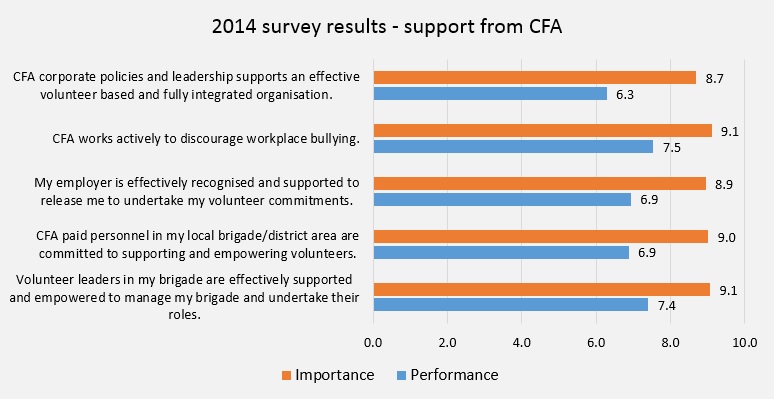
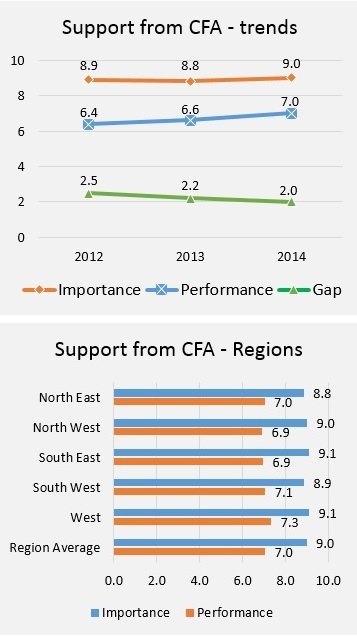
This theme, more than any other, has generated survey responses relating to specific brigade or individual member issues. Issues raised, include the lack of CFA support for the resolution of management issues at brigade level, a high level of CFA staff turnover at Region and District level impacting on support to brigades and budget cuts impacting on resources for volunteers.
Survey comments for this theme are consistent with previous themes in relation to perceived differences in the level of support provided by CFA to paid and volunteer members, and the general feeling that CFA volunteers are being treated as ‘second class’.
Other notable survey respondent comments include a desire to see more CFA staff working in support of brigades rather than in CFA headquarters on projects, a concern regarding the lack of training for volunteers in administrative roles, and a number of comments that CFA is too focussed on the metropolitan area and not providing sufficient support to regional Victoria brigades.
Whilst performance has improved over the past three years (6.4 to 7.0) resulting in a smaller gap, importance has remained consistently high, reinforcing the fact that support from CFA remains a high priority for volunteers.
The gap improvement from 2.5 to 2.0 is driven by improved performance across all statements within the themes. Statement performance scores all improved between 0.2 and 0.7 in 2014 as compared to the 2013 results.
The statement “CFA paid personnel in my local brigade/district area are committed to supporting and empowering volunteers” improved in performance score by 0.7 from 2013 to 2014 – the equal highest statement performance improvement in the 2014 survey.
There are minor variations in the Region scores as compared to other themes. As previously discussed in the Cooperation theme observations for Regions, further analysis of the factors influencing these results may reveal more valuable information.
2014 VFBV Volunteer Survey - Cooperation
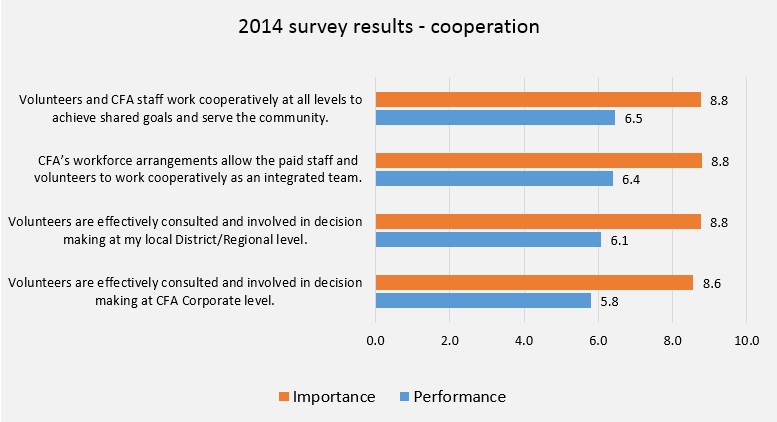
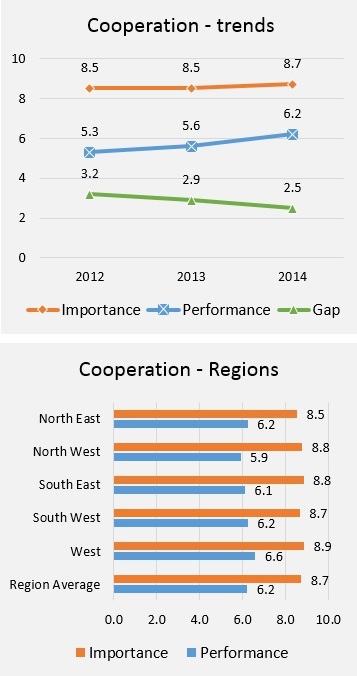
Within the Cooperation theme, the poorest performing aspect relates to how volunteers feel about the way they are consulted and involved in decision making at the CFA corporate level.
Despite improvements in the performances scores for all four statements in this theme in 2014, scores for this theme are generally low for both 2013 and 2014 results as compared to the rest of the survey.
The statement “volunteers are effectively consulted and involved in decision making at CFA Corporate level” had the lowest performance score of the survey in 2013 and created the largest gap, however the gap score against this statement has improved. In 2014 this statement ranked second lowest in performance scores and had the second largest gap score, therefore is still an issue of concern for volunteers and should be an equal issue of concern for CFA.
It is important to note however, this aspect also shows the best improvement since the 2012 survey, indicating that whilst volunteers still feel there is a lot more to be done – things are improving.
The survey results confirm volunteers place a high value on being consulted and involved in decision making at all levels of CFA and expect CFA to perform well in this area. Volunteers’ place a very high importance on all CFA people (volunteer and paid staff at all organisational levels) working cooperatively towards shared goals.
The written survey responses in this theme discuss issues relating to perceptions of volunteer poor treatment and lack of respect from paid CFA staff. A common theme is about CFA staff attitude to volunteers on integrated stations, and in some cases the conduct of Operations Officers in the field. Negative comments are also made in regard to CFA management’s lack of connection with volunteers.
Some survey responses also refer to an established ‘them and us’ culture amongst CFA paid staff and volunteers, manifesting in the service and treatment of paid staff at major incidents as compared to volunteers.
A significant improvement in the performance score over the past three years has seen the gap reduce from 3.2 to 2.5. This improvement is mainly influenced by the decrease in the 2014 gap scores for the statements “volunteers are effectively consulted and involved in decision making at CFA corporate level” and “CFA’s workforce arrangements allow the paid staff and volunteers to work cooperatively as a team”.
Survey result variations between Regions show West and North East Region gap scoring less than the other Regions, it would be insightful to explore the factors or initiatives underpinning this result.
2014 VFBV Volunteer Survey - My Role as a Volunteer
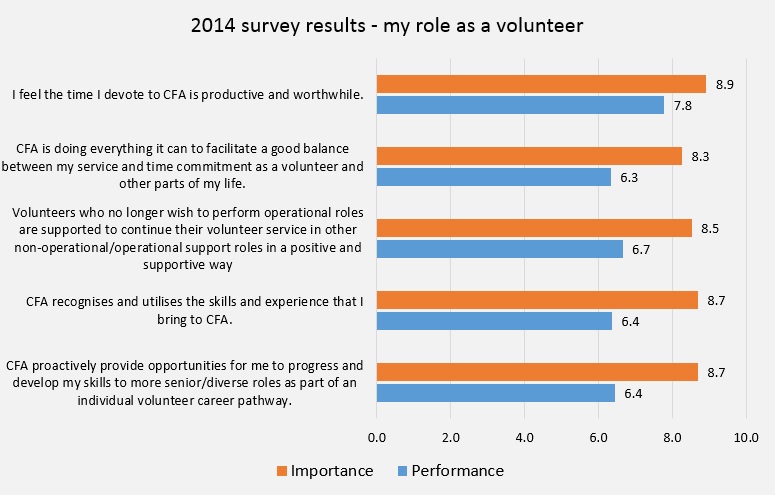
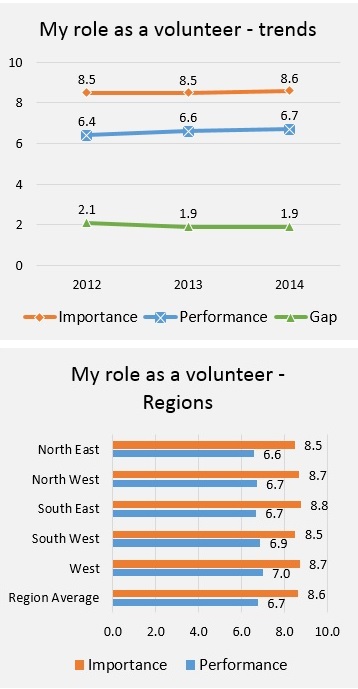
For 2014, the largest individual survey question gaps for this theme appear against the statements “CFA recognises and utilises the skills and experience that I bring to CFA” and “CFA proactively provide opportunities for me to progress and develop my skills to more senior/diverse roles as part of an individual volunteer career pathway”.
This is consistent with the survey results generally poor performance in the survey questions relating to CFA training (see Training by CFA).
The survey comments are along similar themes to respect and professionalism, with a focus on low levels of support to volunteers, the desire for recognition and appreciation, and comments on poor treatment by CFA paid staff.
The increasing non-operational workload for volunteers continues to be an issue, with a number of survey responses citing the increasingly unsustainable workload around meeting attendance and participation in CFA projects.
These comments include statements that volunteer activity outside the traditional response activity, is not adequately recognised and supported by CFA.
Survey comments indicate that undertaking strike team activity as an emergency response and then spending considerable time on scene waiting to be tasked, continues to frustrate volunteers who then feel, that the limited time they have available to volunteer, is not being effectively used by CFA.
In some cases, these comments are followed by a statement that the problems are repeated year after year and if not fixed, the volunteer will not attend strike teams in the future and only support local brigade call outs.
Some of the positive comments relating to this theme were that respondents enjoy being a volunteer member of CFA and state, how joining a volunteer brigade ‘was the best thing they ever did’. These positive comments cover both male and female respondents and include statements from both new and long serving members.
The 2014 survey results indicate that volunteers think CFA could do better with regard to recognition of the skills and experience volunteers bring to CFA. The results also suggest volunteers believe that CFA could improve its efforts in developing volunteer skills and providing individual volunteer pathways across the diverse roles required in CFA.
Overall performance in this theme has improved slightly over the past three years. Respondents indicate that the statements listed in the survey are growing in importance and pleasingly also reported a sense that things have improved since the 2012 survey.
As discussed in Respect and Professionalism, initial Regional variations in the former eight Region model showed variation between outer metropolitan Regions and other Regions.
Regional gap variations across the theme are similar in range to the previous theme, with gaps ranging from 1.9 to 2.1 in the more urbanised Regions as compared to 1.6 to 1.7 in the less urbanised Regions.
2014 VFBV Volunteer Survey - Respect and Professionalism
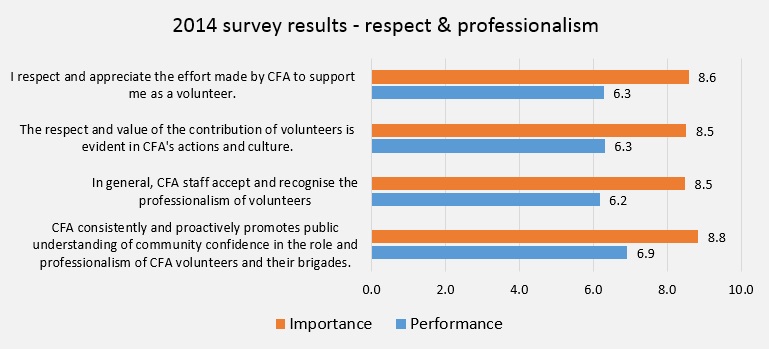
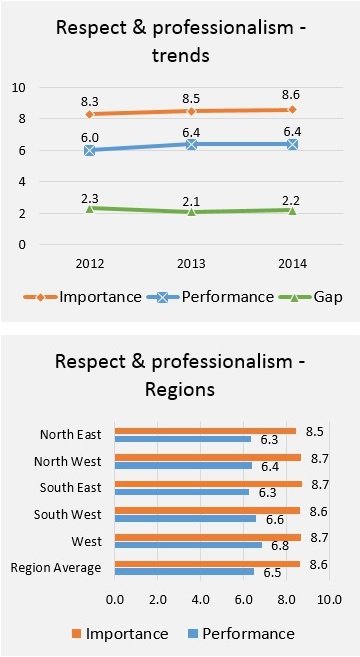
The 2014 survey results for this theme are reasonably consistent with previous years, a notable trend however, is that the respondents feel the issues underpinning respect and recognition of their professionalism are even more important than previous surveys.
Survey results within this theme indicate CFA performing strongest in the statement ‘CFA consistently and proactively promotes the public understanding of community confidence in the role and professionalism of CFA volunteers and their brigades’ and conversely, poorest in the statement ‘the respect and value of the contribution of volunteers is evident in CFA’s actions and culture’.
The majority of the comments on respect and professionalism were about how volunteers feel they are being treated within CFA. A number of negative comments referred to being treated as ‘second class’ by CFA organisationally, when compared to the way CFA manage and support their paid operational staff.
This is also expressed in the way volunteers see themselves treated as ‘second class’ by CFA operational staff in the field. The comments express a frustration with an established culture amongst some CFA paid staff, in the way they treat volunteers.
Specific major incidents were mentioned in the negative comments as examples of where volunteers felt they were not treated with respect, provided the same regard as paid staff to contribute to the event response or given the same level of support as that received by paid staff.
Importance has increased steadily over the past three years, with an initial improvement in performance from 2012 to 2013 then remaining the same for 2014. This has resulted in a marginal gap increase in 2014.
The 2014 survey data was collected against the eight former CFA Regions, and when tabulated by those Regions, it showed significant differences in survey results between the former three ‘Outer Metropolitan’ Regions (Eastern, Northern and Western Metro and South East Metro) and the five other Regions.
When reallocated against the new CFA five Region model, the survey result differences become less apparent as they are ‘absorbed’ into the new Regions’ geographic coverage.
Regional variation should be of concern to CFA, given that the more urbanised areas can generate a higher CFA service demand. Volunteers are generally managing higher activity levels and certainly requiring highest possible levels of volunteer motivation, satisfaction and a feeling their volunteer skills and experience are utilised optimally and their capacity and professionalism is respected and welcome.
2014 VFBV Volunteer Survey - Conclusion
The 2014 VFBV Volunteer Welfare and Efficiency Survey results have provided valuable information direct from CFA volunteers which is vital to informing the emergency management sector on what volunteers need to remain viable and valuable contributors to community safety.
Key observations from the survey results that may warrant further investigation and possible actions include the following.
Training needs and expectations.
The 2014 survey results identify training by CFA as the biggest issue, with the survey gap at 3.0. This remains the most important issue for CFA volunteers and the issue least meeting volunteer expectations.
Variation between brigades.
Brigades with an integrated volunteer/career mix of personnel are more concerned with performance in relation to people management within their brigade, cooperation, respect and professionalism.
Equity, diversity and workplace behaviour.
Survey results show that equity and diversity across gender, race and religion are important issues to volunteers. When tested against gender – female respondents rated both importance and performance lower than male respondents in relation to the statement “there are no barriers to the roles women can occupy in my brigade”, and the gap between importance and performance for female respondents was higher than male, signalling that male respondents are more optimistic about how gender, equity and diversity issues are being managed and may not realise areas of deficiency. Whilst CFA performance in this area is scored comparatively well against other areas, it remains an area that will require ongoing support.
The importance of consultation with brigades.
The value volunteers place on consultation both within their own brigade and with CFA, is expressed in the survey results where statements referring to consultation within brigades receive good performance scores whilst conversely, statements regarding effective consultation at CFA District, Region or Corporate level, receive the lowest performance scores and high gaps.
Written comments from survey respondents refer to issues where inadequate consultation may be the root cause, further suggesting that more work is required to improve consultation between CFA and volunteers.
The influence of volunteer length of service.
Volunteer length of service has created a distinct pattern across the question responses. Volunteers who have served with CFA for less than one year are the most positive about the organisation and their brigade on nearly every question. The gap sharply increases after their first year of service, i.e. their level of satisfaction drops sharply after one year and then again after more than five years’ service.
This warrants further investigation to determine the causes of the change in expectation.
Satisfaction.
80% of 2014 survey respondents are satisfied with their role as a CFA volunteer and 87% intend to continue their membership. The overwhelming reasons for being a CFA volunteer are “to help protect the community I live in” or “a sense of fulfilment in supporting my community in a meaningful way” (total 94%).
Only 59% of volunteers are satisfied with the way they are treated by CFA, this comparatively low satisfaction score suggests that the greatest potential impact on future volunteer welfare and efficiency sits with CFA in the success or otherwise of their partnerships with volunteer brigades.

2014 VFBV Volunteer Survey - Observations
Strengths.
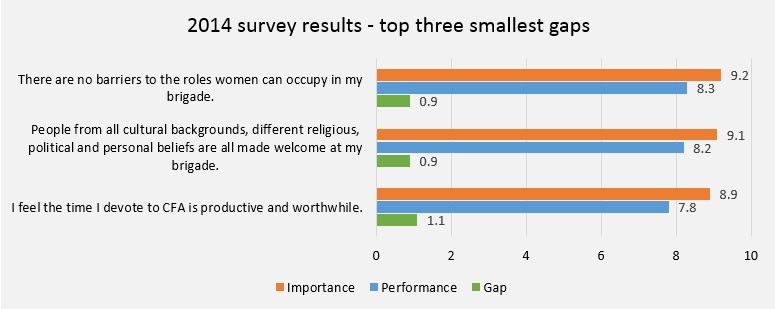
In 2014, the ‘top three’ smallest gaps (i.e. highest satisfaction levels) between importance and performance, were for the survey statements listed above. When compared against importance scores for statements, the equal highest importance score was against the statement “there are no barriers to the roles women can perform in my brigade”.
For the performance scores, the two highest scores were against the statements “there are no barriers to the roles women can perform in my brigade” and “people from all cultural backgrounds, different religious, political and personal beliefs are all made welcome at my brigade”.
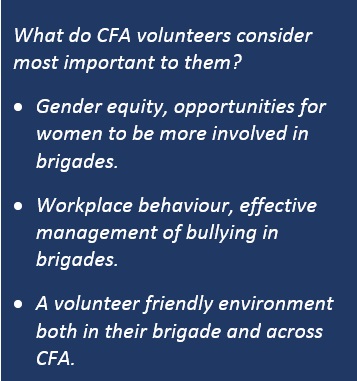
This is consistent with 2013 survey results where the same questions scored highly in importance and performance, as well as having small gaps.
Written comments from respondents support the overall CFA approach to encouraging diversity and addressing poor workplace behaviour, but some of the comments refer to ongoing workplace behaviour issues at specific brigades that are being poorly managed or ignored.
The statement “I feel the time I devote to CFA is productive and worthwhile” scores consistently high on importance and performance and records the third smallest gap across the last two surveys. This is reflective of the survey results for volunteer satisfaction with their role in CFA.
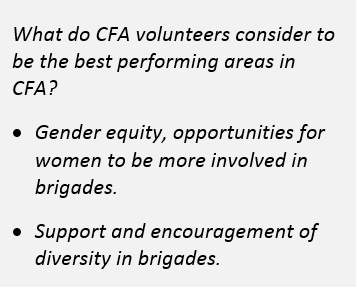
Weaknesses.
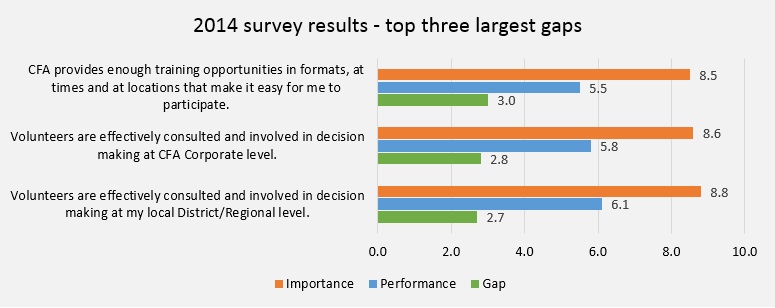
In 2014, the ‘top three’ largest gaps (i.e. lowest satisfaction levels) between importance and performance, were for the survey statements listed above.
The largest gap between importance and performance for a single statement was a score of 3.0 for the statement “CFA provides enough training opportunities in formats, at times and locations that make it easy for me to participate”. This is consistent with 2013 survey results for the same statement having the largest gap and low satisfaction levels.
The two statements considered as the worst performing by 2014 survey respondents were “CFA provides enough training opportunities in formats, at times and locations that make it easy for me to participate” and “volunteers are effectively consulted and involved in decision making at CFA corporate level”. Both statements scored below 6 for performance, the only two to do so in 2014.
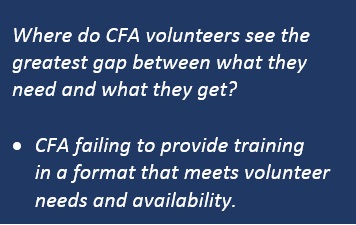
The biggest improvement in gap, between importance and performance for a statement from 2013 to 2014 survey results, was the decrease in gap for the statement “volunteers are effectively consulted and involved in decision making at CFA corporate level”.
Whilst this may be seen as a positive, this is the only statement to score below 5 in importance in 2013 and the improvement to a score of 5.8 in 2014, the improvement is coming from a very low base and remains an issue for volunteers.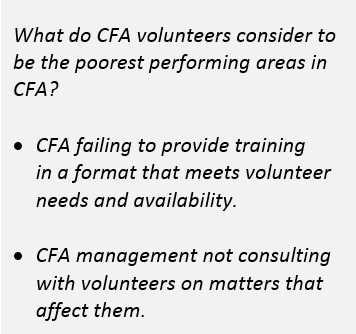
To take part in the 2015 VFBV Volunteer Survey, send your name, Brigade and email address to This email address is being protected from spambots. You need JavaScript enabled to view it.
2014 VFBV Volunteer Survey - Data Integrity
The first survey in 2012 attracted responses from 805 CFA volunteers. Subsequent surveys using the same format have seen the survey result increase to 1,652 volunteer responses in 2014.
Given the high number of survey responses against the number of CFA volunteers, this represents a very robust sample of the views of CFA volunteers and can be treated as a ‘statistically significant’ response.
Sample size calculators indicate that 1,652 valid survey responses from a CFA volunteer ‘population’ of 60,000 provides a 95% level of confidence (getting the right answer 95 times out of 100) in the survey results, as representing the views of CFA volunteers.
Previous survey analysis for VFBV by Dawson McDonald demonstrated the statistical significance of the survey results against well-known Australian surveys. The VFBV survey results in 2013 achieved a 95% confidence level with a confidence interval of +/- 2.6%, considerably greater than many national surveys.
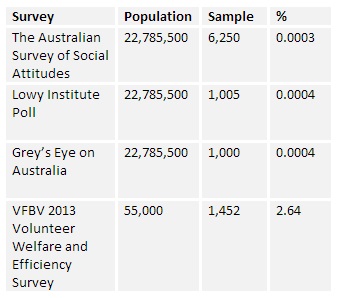
Confidence interval comparison table - VFBV 2013 Volunteer Welfare and Efficiency report.
Survey respondents were given the option of responding anonymously or leaving their email address if they wished to be kept informed on progress with the survey results. This ensured that the survey respondents could provide their honest and open opinions in their written responses to the survey statements.
For security purposes, all online survey responses are entered into a securely encrypted electronic survey record system. All physical survey responses are also entered into the online system and destroyed once the data is recorded.
2014 VFBV Volunteer Survey - Data Collection
The VFBV Volunteer Welfare and Efficiency Survey was from the outset, designed and detailed by CFA volunteers.
In 2012, with the assistance of a professional survey development consultancy, VFBV workshopped with volunteers from across Victoria, to identify key issues considered to be the key factors underpinning their welfare and efficiency. Key recurring themes emerging from the workshop with this group were then used to construct the survey.
The survey consists of 33 statements addressing the welfare and efficiency of CFA volunteers. Survey respondents are asked to score each statement twice: firstly on how important it is for the statement to be true and secondly, how they perceive performance against that statement. Scores are applied to a 0 – 10 sliding scale where for importance, 0 is ‘not at all important’ and 10 is ‘very important – and in the case of performance, 0 is ‘strongly disagree’ and 10 is ‘strongly agree’.
Scores for importance are regarded as the expectations of CFA volunteers. Where scores for performance are lower than those for importance, the result suggests that expectations are not being met. The difference between importance and performance in the survey results for each question is referred to as the gap.
The chart below indicates a typical survey response against a given statement, where the total number of responses to the statement produce an average gap between importance and performance (in this case ‘2’).
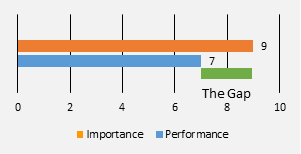
The 33 survey statements are grouped into seven themes for analysis of the results. Statements are randomly listed in the survey to avoid leading the results. The results are then re grouped under seven themes for analysis purposes.
The seven survey analysis themes are:
- Respect and professionalism
- My role as a volunteer
- Cooperation
- Support from CFA
- Training by CFA
- Recruitment and retention
- People management – my brigade
The survey design allows each theme to be explored for variations between respondents, including brigade service/risk environment (rural, urban or integrated), gender, volunteer age and length of service.
The results can also be analysed from Region to Region, with CFA’s Regional structure allowing for the identification of examples of good practice or conversely, areas where a lacking performance needs most attention.
Whilst the survey collects quantitative data that is easily expressed in results that measure importance, performance and gap, the survey also provides the respondent the opportunity to reply to any of the statements with their own thoughts and opinions.
In this way the survey also collects some qualitative data than can be used to gain insight into what sits behind the numerical results.
With survey results from the past three years, VFBV is now able to observe trends over time.
Recently, further work has also been undertaken with the assistance of university researchers with expertise in quantitative survey analysis to drill down into the survey results and explore specific demographic trends or patterns that emerge.
2014 VFBV Volunteer Survey - Introduction
The Country Fire Authority (CFA) is a community and volunteer based emergency service, consisting of 60,000 volunteers and 1,300 paid operational and support staff. CFA Brigades protect 60% of suburban Melbourne, regional cities and all of country Victoria every day and night of the year.
CFA’s volunteer based resource model is the only approach capable of economically and practically dealing with the quantum, scale, spread and simultaneous occurrence of fire and other emergencies experienced in Victoria while still providing day to day emergency response.
CFA’s unique integrated volunteer and career staff operating model is fundamental to the surge capacity required to deal with large scale incidents while still providing professional standards of emergency response in Brigade service areas across the state.
The CFA volunteers’ contribution to the community is incalculable – the value of their labour alone is estimated at one billion dollars a year, without considering the replacement cost of their expertise, local knowledge, fundraising, leadership and the substantial losses that would be suffered through fires and other emergencies if the volunteers were not there.
CFA volunteers work at all levels of emergency response, from the frontline crews, through experienced volunteers in specialist and support roles, to the highest of senior incident management roles.
The need for that resource of trained, experienced volunteers is growing. Already one of the most wildfire prone areas in the world, Victoria faces the twin challenges of a rapidly growing population and increased urbanisation within an expanding metropolitan Melbourne and regional cities.
In 2012, the Victorian Parliament unanimously supported changes to the CFA Act to enshrine the requirements for volunteer support and recognition in legislation. 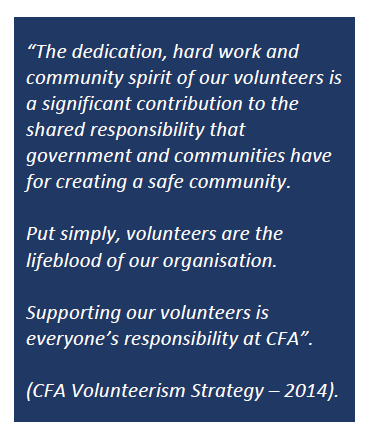
These important changes recognise that CFA is first and foremost a volunteer-based organisation, in which volunteer officers and members are supported by career staff in a fully integrated manner.
Sections 6G, 6H and 6I of the CFA Act also reinforce the requirement for Government and CFA to encourage, maintain and strengthen the capacity of volunteers to provide the Authority's services, and to consult with VFBV on all matters which may impact upon volunteers.
Volunteer Fire Brigades Victoria (VFBV) is the voice of CFA Volunteers. It is established under Victorian law, the Country Fire Authority Act, to represent the volunteers on all matters that affect their welfare and efficiency.
As an organisation made up of the CFA volunteers it represents, VFBV works in partnership with the State Government, Emergency Management Victoria, the CFA Board and Management, Members of Parliament, official inquiries, municipal councils and instrumentalities, business and the public to proactively shape the future of emergency management.
VFBV is active in partnering with Government and emergency management agencies to ensure that volunteers remain actively involved in emergency management decision making at every level; through day to day practical work in VFBV/CFA Joint Committees, through the Ministerial level Volunteer Consultative Forum, and in working to ensure positive, practical results from reviews such as the Jones Inquiry and the Victorian Auditor General’s Office (VAGO) report on Managing Emergency Services Volunteers.
The VFBV Volunteer Welfare and Efficiency Survey takes this important work another step forward, by addressing a significant gap in the information available to the state’s decision makers.
The VFBV Volunteer Welfare and Efficiency Survey, now in its third year, is designed to better understand the issues as volunteers see them, and is used by VFBV to bring the frontline volunteers’ opinions and advice on matters affecting their welfare and efficiency directly to the state’s decision makers.
The purpose of the VFBV Volunteer Welfare and Efficiency Survey is to ensure that volunteers’ needs and expectations are sought, analysed and available to Government and CFA so the very foundation of this volunteer-based emergency service continues to be recognised and supported to meet the future emergency services needs of the Victorian community.
The VFBV Volunteer Welfare and Efficiency Survey presents an opportunity for Government and CFA to embed performance measures linked to volunteer welfare and efficiency into CFA organisational, departmental and individual work plans, to the benefit of the Victorian community.
Because volunteers are fundamental to Victoria’s emergency management capability, fundamental to community resilience and at the core of communities sharing responsibility for their own safety, it is vitally important to measure and deeply understand how satisfied volunteers are with arrangements in place to support, encourage and enable them to do their work.
If the CFA and State Government wish to retain what is a highly valuable volunteer fire service, the expectations of volunteers, identified by them through this survey, need to be understood and acted upon. A commitment must be made by CFA, VFBV and State Government to meet or exceed the expectations of volunteers on all 33 items. This is fundamental to ensuring the welfare and efficiency of volunteers and their continuing availability as an unpaid emergency service.
2014 VFBV Volunteer Survey - Executive Summary
Observations from the survey results that may warrant further investigation and possible actions include the following:
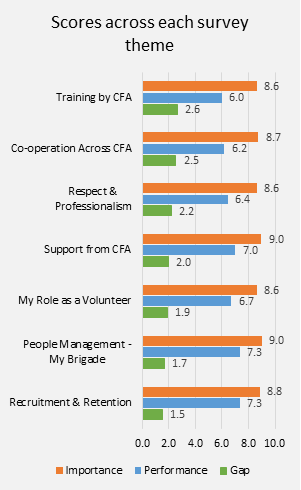
- Training needs and expectations.
The 2014 survey results identify training by CFA as the biggest issue, with the survey gap at 3.0. This remains the most important issue for CFA volunteers and the issue least meeting volunteer expectations.
- Variation between brigades.
Brigades with an integrated volunteer/career mix of personnel are more concerned with performance in relation to people management within their brigade, cooperation and respect and professionalism. Survey comments point to ongoing issues at integrated brigades that require further attention.
The integrated volunteer/career survey responses consistently scored lower on importance and more so on performance. Integrated brigades scored poorly on performance in relation to workplace bullying, conflict resolution, volunteer consultation, morale and supporting new volunteers. These particular statistical results point to ongoing issues within integrated brigades that require specific attention.
- Equity, diversity and workplace behaviour.
Survey results show that equity and diversity across gender, race and religion are important issues to volunteers. Generally, female survey respondents rated CFA respect, professionalism, volunteer support and brigade support more highly than males across both importance and performance. The differences occur when the questions relate to CFA’s performance in conflict resolution, bullying and harassment, in which case, females rate the management of such issues lower than males.
When tested against gender – female respondents rated both importance and performance lower than male respondents in relation to the statement “there are no barriers to the roles women can occupy in my brigade”. The gap between importance and performance for female respondents was higher than male, signalling that male respondents are more optimistic about how gender, equity and diversity issues are being managed and may not realise areas of deficient approach.
Whilst CFA performance in this area is scored comparatively well against other areas, it remains an area that shows that a gender perception gap still exists in brigades and will require ongoing support.
- The importance of consultation with brigades.
The value volunteers place on consultation both within their own brigade and with CFA is expressed in the survey results where statements referring to consultation within brigades receive good performance scores. Conversely, statements regarding effective consultation at CFA District, Region or Corporate level, receive the lowest performance scores and high gaps.
Written comments from survey respondents refer to issues where inadequate consultation may be the root cause, further suggesting that more work is required to improve consultation between CFA and volunteers.
- The influence of volunteer length of service.
Volunteer length of service has created a distinct pattern across the question responses. Volunteers who have served with CFA for less than one year are the most positive about the organisation and their brigade on nearly every question. The gap sharply increases after their first year of service, i.e. their level of satisfaction drops sharply after one year and then again after more than five years’ service.
- Satisfaction.
80% of 2014 survey respondents are satisfied with their role as a CFA volunteer and 87% intend to continue their membership. The overwhelming reasons for being a CFA volunteer are “to help protect the community I live in” or “a sense of fulfilment in supporting my community in a meaningful way” (total 94%).
Only 59% of volunteers are satisfied with the way they are treated by CFA, this comparatively low satisfaction score suggests that the greatest potential impact on future volunteer welfare and efficiency sits with CFA in the success or otherwise of their partnerships with volunteer brigades.
- Overall.
Overall results across the survey themes (see the graph to the right) show the greatest gaps to be in the training and cooperation themes, and the smallest gap in the recruitment and retention theme. Specific responses within each theme are explained in greater detail in the body of this report.
The analysis of the survey results shows that there are still differences of opinion between genders as to how women are treated in CFA, between volunteer and integrated brigades on how CFA staff treat volunteers, and difference of opinion on how well CFA is performing depending upon how long the volunteer has known CFA.
These differences point to an ongoing need for CFA to improve its culture. The attitudes and norms across CFA need to become more inclusive and more respectful – in terms of volunteer value to the organisation.
2014 VFBV Volunteer Welfare and Efficiency Survey Report
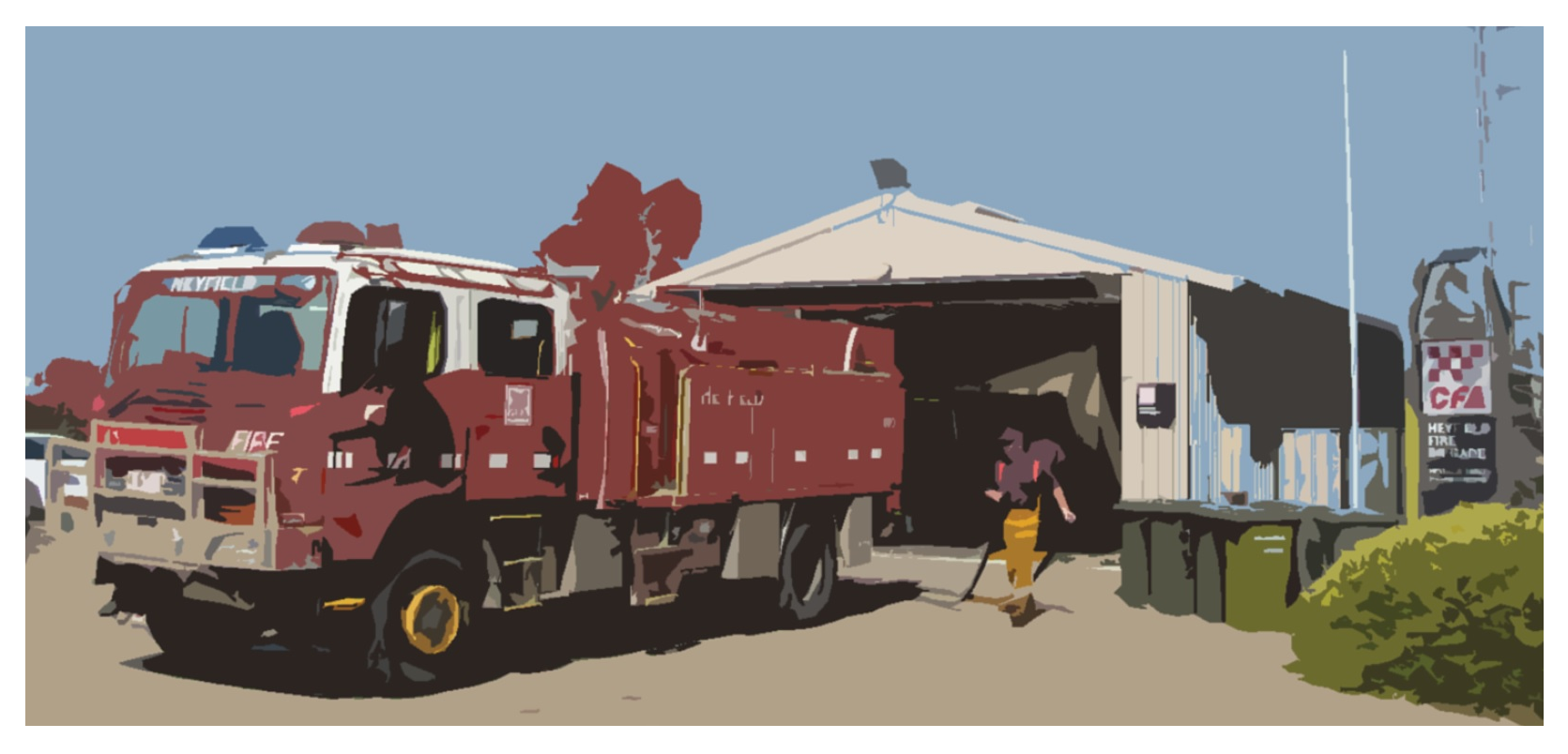 This report provides comment and detail on matters considered to be important to CFA Volunteers' welfare and efficiency, as measured through the Volunteer Fire Brigades Victoria (VFBV) Volunteer Welfare and Efficiency Survey.
This report provides comment and detail on matters considered to be important to CFA Volunteers' welfare and efficiency, as measured through the Volunteer Fire Brigades Victoria (VFBV) Volunteer Welfare and Efficiency Survey.
The report uses survey data provided by a series of statements rated by volunteers for importance and performance. The report also uses information gathered from written response comments against the survey statements.
Observations against the 2014 survey results are presented by survey theme, with comments on both the survey scores and the written comments received.
As with the previous two years, survey data is collated and analysed for trends, outliers and exceptions that guide us to particular issues warranting further analysis. The survey results are compared against demographic profiles that include gender, age, length of time as a volunteer and brigade type.
The survey data is also compared to previous years' results to determine if changes have occurred and whether reasons for these changes can be identified.
Click on the links below to see each of the detailed sections of the 2014 VFBV Volunteer Welfare & Efficiency Survey report;
- Foreword, by VFBV Chief Executive Officer Andrew Ford
- Executive Summary
- Introduction
- Observations
- Respect and Professionalism
- My Role as a Volunteer
- Cooperation
- Support from CFA
- Training by CFA
- Recruitment and retention
- People Management - My Brigade
- Demographic Variations
- Volunteer Satisfaction
- Conclusion and Survey Questions Gap Scores
The 2015 survey will open in July - you can sign up to take the online survey here or request a paper copy of the survey by calling (03) 9886 1141. Your comments will be confidential.
2014 VFBV Volunteer Welfare and Efficiency Survey Report
To all participants in the 2014 VFBV Volunteer Welfare and Efficiency Survey, thank you for taking part.
The Survey Report is available for download at the bottom of this page (Note: the top of the first page is white - if it looks blank on your screen, scroll down a little).
Now in its third year, this survey continues to grow in importance as it captures trends in CFA volunteers’ opinions on matters affecting their welfare and efficiency.
VFBV and the CFA Board have both studied past years' results and will use the survey to highlight aspects of volunteer support that need attention.
The survey would not have been possible without the support of CFA volunteers, in particular the 1,652 – another record number - who participated in 2014.
Please consider the trends revealed in the survey report and encourage your fellow volunteers to do the same. Printed copies are available by mail if you need them, call (03) 9886 1141.
Please also encourage the volunteers around you to sign up for the next VFBV volunteer survey, by emailing their name and Brigade to This email address is being protected from spambots. You need JavaScript enabled to view it. or calling (03) 9886 1141 if they would like the paper version of the survey posted to them.
CFA communications survey
Two years ago, CFA asked members what their communications preferences were. The results of that survey led to a number of improvements including the regular inclusion of Regional Director columns in Brigade magazine and the introduction of an online version of the magazine.
Communications technology is rapidly evolving, especially with the revolution in smart phone use, so CFA is going back to members to ask again how they wish to be kept informed and which content they find useful.
The online will take 5 minutes to complete, and the responses collected will help CFA better understand the communication needs of staff and volunteers.
The 2014 survey is now available here:www.surveymonkey.com/s/Comms2014
The survey will close on Monday 4 August, and, a printed copy will be included in the winter edition of Brigade magazine.
Have your say on . . .
- VFBV's third Volunteer Survey - register now
The third VFBV Volunteer Welfare & Efficiency Survey will be online in the middle of 2014. To pre-register to receive the survey via email, click here.
The survey is a total of 33 questions chosen by volunteers and takes about 15 minutes to complete. Your answers are confidential.
Last year’s survey was a great success with more than 1,400 participants. VFBV examined the results in detail to guide its own actions and briefed the CFA Board. See the full report here.
The third survey will show trends in volunteer opinions on issues chosen by your fellow volunteers and if you register today you’ll receive the survey automatically as soon as it opens.
- CFA Training Strategy Survey - deadline extended to 15 April
You can download CFA’s Training Strategy Implementation Survey on Brigades Online or click here to take part. The survey closes on 15 April.
Have your say on . . .
- VFBV's third Volunteer Survey - register now
The third VFBV Volunteer Welfare & Efficiency Survey will be online in the middle of 2014. Pre-register to receive the survey via email, by sending your name, district and email address to This email address is being protected from spambots. You need JavaScript enabled to view it.
The survey is a total of 33 questions chosen by volunteers and takes about 15 minutes to complete. Your answers are confidential.
Last year’s survey was a great success with more than 1,400 participants. VFBV examined the results in detail to guide its own actions and briefed the CFA Board. See the full report here.
The third survey will show trends in volunteer opinions on issues chosen by your fellow volunteers and if you register today you’ll receive the survey automatically as soon as it opens.
- CFA Training Strategy Survey - deadline extended to 15 April
You can download CFA’s Training Strategy Implementation Survey on Brigades Online or click here to take part. The survey closes on 15 April.
CFA Training Strategy Survey
CFA invites all members to respond to its Training Strategy Implementation Survey.
The Strategy, and a hard copy of the survey, can be downloaded from Brigades Online (Training > Strategy > F&EM Training Strategy).
The survey will be open until 31 March, 2014.
Click here to take the survey, which will take about five minutes to complete.
SURVEY - DEADLINE 9 FEB - Portability and Training Qualifications for Emergency Volunteers
The survey is 9 February – click here to take part.
The Australian Emergency Management Volunteer Forum (AEMVF) is running a survey open to emergency management volunteer organisations and volunteers.
The survey is for the Portability and Training Qualifications for Emergency Management Volunteers project. It is being conducted by the Australian Red Cross, for the AEMVF, and is funded through the National Emergency Management Projects program. The results will be published by the Commonwealth Attorney-General's Department later this year.
Download the document below for details.
The address of the survey itself is; https://www.surveymonkey.com/s/H6KNCFF
CFA's Vols on Hols Survey
CFA Survey: When holidaying, would you be interested in responding to incidents with a local brigade?
CFA is calling on members to indicate whether they would consider turning out with the local brigade where they are holidaying.
Fill in the online survey here (taking part enters you in the draw for a small prize) or call Operational Training & Volunteerism’s Rhonda Day on 0417 109 800 or Lisa Cruickshank on 0417 096 325.
The survey closes on 13 December 2013.
Establishing a CFA Diversity Network
Dear CFA volunteer
As our local communities change and often become more diverse, we need to find ways to help Brigades adapt to these changes. This is why the Engaging Diverse Communities Project Team is seeking interest in establishing a CFA Diversity Network.
The network would give interested CFA members:
• A deeper understanding of the issues facing diverse communities
• Practical skills and knowledge needed to engage with diverse communities and
• Help create welcoming environments where diversity is celebrated within Brigades
And of course, this aims to help Brigades and communities become more resilient!
The Aim of This Survey
We know you’re probably sick of surveys but we really hope you’ll take a few minutes to complete this one as we’re keen to take direction from CFA members on where we go with the Diversity Network. Your responses will be kept confidential.
You can access the survey by clicking on this link.
The survey will be open until the end of September 2013 so please take this opportunity to have your voice heard before then.
If you experience problems completing the survey, or have any questions about the Diversity Network, please do not hesitate to contact Debra Salvagno: This email address is being protected from spambots. You need JavaScript enabled to view it.
Thank you for taking the time to complete the survey!
Why be involved in the Network?
By being involved in the Diversity Network you will have an opportunity to focus on this important area of community engagement. The Network will bring members together to share ideas and learn how to actively engage with the diverse members of our community.
The Network will be supported by staff working on the Volunteer Support Program in the Engaging Diverse Communities Project.
By being involved, you can help create and promote an atmosphere in your Brigade that values diversity, and where all members are treated with respect and dignity.
How involved you are is entirely up to you!
2 Minute Briefing - Community Safety Advisory Committee
Issue 5, 19 May 2013
Quick snapshot of the priority issues and actions worked through at the most recent Joint Committee meeting between CFA and VFBV. (Meeting held 19/05/2013)
PLANNED BURNING SURVEY 2013
Continuing on from our last 2 Minute Briefing the Committee has suggested refinements to the content of the survey which will canvas the attitudes towards, experiences with and brigade expectations of planned burning.
Many brigades already use planned burning as excellent training and skills maintenance activities, and recognise that participating in planned burning contributes significantly to our understanding of fire behaviour and tactics. And yet brigades do not have the ability to track, report or recognise their members’ involvement through a CFA centralized system.
Recognising there are significant limitations on how much planned burning volunteers can do and that planned burning is a high risk activity requiring trained and experienced fire fighters and resources, the survey asks questions about brigade participation, past, present and future. The survey explores possible future brigade capacity to be more involved in planned burning operations, and the support volunteers would require, and allows members to indicate the barriers to brigade participation they see such as volunteer availability, access to training, skills maintenance opportunities, and equipment and resourcing requirements.
CFA is under increasing pressure to be more involved with planned burning, so it is vital that members assist with identifying any barriers or frustrations that prevent volunteers from being more involved. Your feedback to this survey will shape future CFA & Government policy.
RESIDENTIAL FIRE SAFETY CAMPAIGN 2013
Facts: More people die in Victoria each year from house fires – than they do from bushfires. Most fatal fires occur in the home! They can be prevented. One third of all residential fires occur in the kitchen. Under the CFA Act, Brigades are not only required to respond to these fires when they occur, but also to assist their community prevent these kind of fires in the first place.
The Home Fire Safety Campaign is a joint MFB/CFA campaign and it acknowledges the fact that house fires happen all year round. The campaign will commence in late May and will feature high profile chef ambassadors attracting the media and spreading the message about understanding fire risks in the home.
Delegates were briefed in the campaign details and are working with CFA to ensure the message reaches local and regional communities as well as metropolitan Melbourne.
VEGETATION MANAGEMENT
In addition to the Planned Burning Survey, the committee has requested CFA perform a review of its Vegetation Management Program to better understand the successes of the program as well as any barriers preventing VMO’s from assisting brigades with their needs. Brigades will be asked to contribute specific examples of vegetation management issues to the review as well as their feedback regarding their involvement with Vegetation Management Officers since the program commenced in 2010.
URGENT: SURVEY PARTICIPANTS WANTED
VFBV is conducting phone interviews with volunteers
15 to 20 minutes of your time
Help us to reach the individual volunteer
The Jones Inquiry into the Effects of the Arrangements made by CFA on its Volunteers made a recommendation that VFBV consider amending its constitution to enable individual volunteers to be members of our association.
With Department of Justice support under the Valuing Volunteers Program, VFBV has begun to explore priorities and activities to increase our connection with the volunteer as an individual and better meet the future expectations of volunteers. This project will report to the VFBV board with some opportunities for us to embrace into the future.
As part of this project we are conducting informal telephone interviews with CFA volunteers from across the state. It doesn’t matter if you hold a position in your Brigade, are a VFBV delegate or an ordinary Brigade member, we want to speak to anyone who has ideas on how VFBV can increase our engagement with our members.
If you are interested in being part of this project please contact the Project Officer, Kara Bishop, by AUGUST 1ST on 9886 1141 or email This email address is being protected from spambots. You need JavaScript enabled to view it. to arrange a suitable interview time.
Planned Burning Survey prompts change
UPDATED 13 SEPTEMBER 2013
Initial indications from the CFA/VFBV Planned Burning survey have highlighted the frustration Brigades are experiencing with overly prescriptive permit conditions.
The early results suggest many Brigades were interpreting the guidelines in the permits as strict conditions, so CFA plans to review the wording and language used on the permit template that is issued to brigades for approved planned burns.
Having pressed for change and assisted with dissemination of the survey, VFBV hopes changed language on the permits, refined instructions and better information on what levels of flexibility are considered compliant within the permit conditions will build Brigades’ confidence that the permit conditions are achievable.
VFBV Welfare & Efficiency Survey 2013 – the results
The third VFBV Volunteer Welfare & Efficiency Survey will be online in the middle of 2014. To pre-register to receive the 2014 survey via email, click here.
The survey is a total of 33 questions chosen by volunteers and takes about 15 minutes to complete. Your answers are confidential.
Last year’s survey was a great success with more than 1,400 participants. VFBV examined the results in detail to guide its own actions and briefed the CFA Board. Download the full report below.
The third survey will show trends in volunteer opinions on issues chosen by your fellow volunteers and if you register today you’ll receive the survey automatically as soon as it opens.
Download the full report below
VFBV’s role under the CFA Act is to ‘consider and bring to the attention of the Authority (CFA) all matters affecting volunteer welfare and efficiency (other than questions of discipline and promotion).
Earlier this year, VFBV conducted its second survey to measure volunteer perceptions about key matters that volunteers feel impact on their welfare and efficiency.
There was again a tremendous response, with more than 1,450 participants – an 80% increase over the 2012 survey – with more volunteers responding from every District, and greater percentages of female volunteers, younger volunteers and newer volunteers.
The survey gave volunteers the chance to improve the future welfare and efficiency of CFA volunteers and to better equip VFBV for its work.
You can download the full results of the 2013 survey below.
The first survey was well received by CFA’s Board and senior management in 2012, and VFBV now looks to working with CFA in moving from identifying areas needing attention to actively working to achieve improvements in those areas.
Every person who has completed the survey and provided contact details will be sent a full copy of the survey.
The survey is designed to provide a benchmark assessment of CFA volunteers’ perceptions about key factors affecting their welfare and efficiency.
Ongoing surveys will allow us to compare results with the earlier surveys and identify ongoing trends. To pre-register to receive the 2014 survey via email, click here.
VFBV will now continue work with CFA to explore reasons behind key performance gaps; recognise and promote good practice; find solutions to address identified weaknesses; and provide the starting point for future trend analysis and continuous improvement.
VFBV Publications
This page is a resource for volunteers, with a wide range of useful documents for download, including;
- VFBV Annual Reports
- VFBV Notes for Members and News Notes for MPs, explaining major issues like fleet funding, presumptive legislation – the firefighters’ cancer law – and volunteer concerns over industrial interference in CFA
- Reports and data analysis from the annual VFBV Volunteer Welfare & Efficiency Survey
- The CFA Volunteer Charter
- The VFBV Volunteer Welfare Fund Brochure
- The VFBV Constitution
- The Volunteer Code of Conduct
- The VFBV Brigade Delegate pack, containing useful information and resources for volunteers representing their Brigades at VFBV District Council meetings
To find VFBV's monthly newsletter, our Page 2 column in FireWise, click here.




